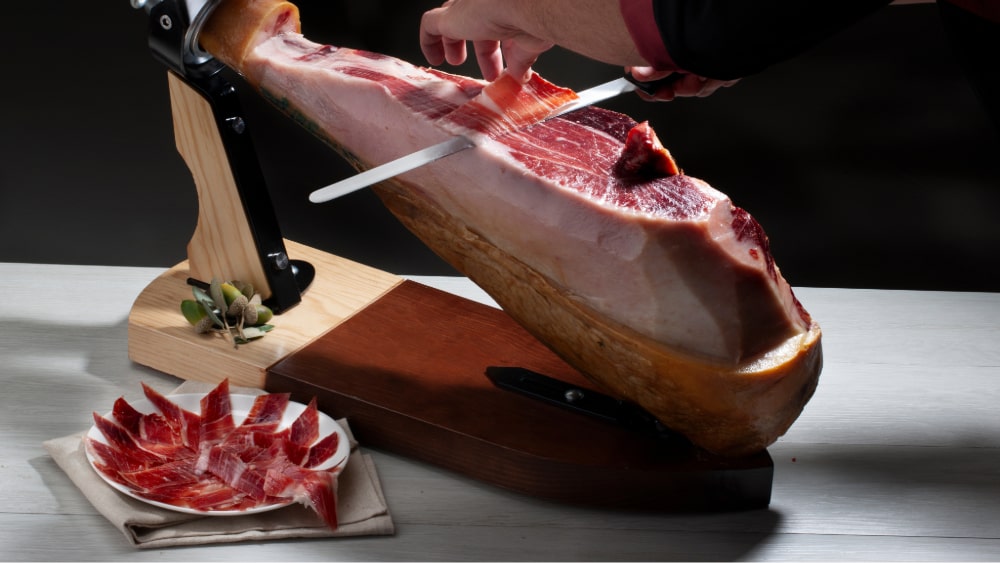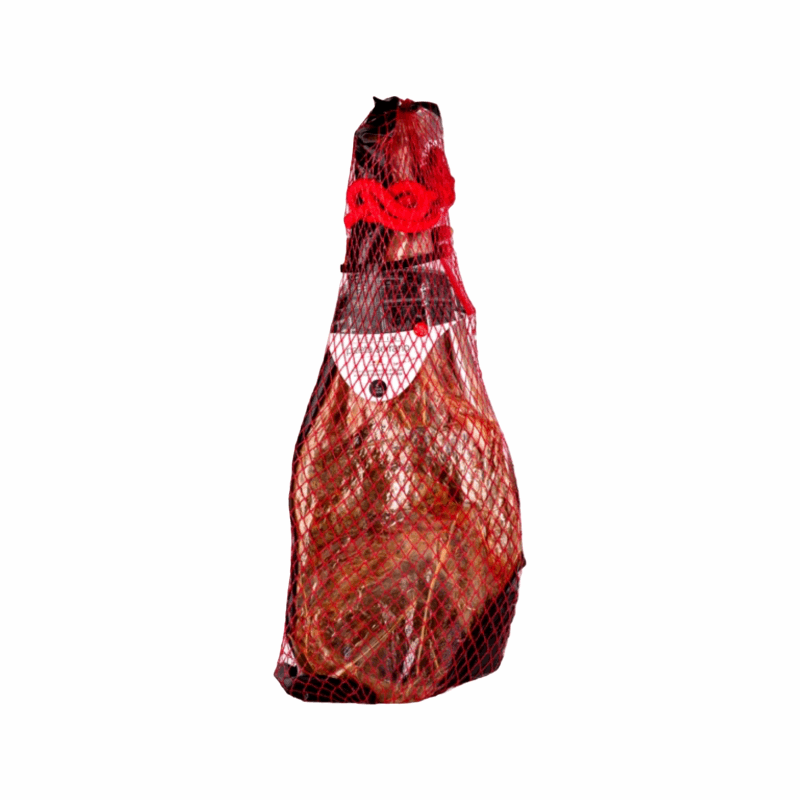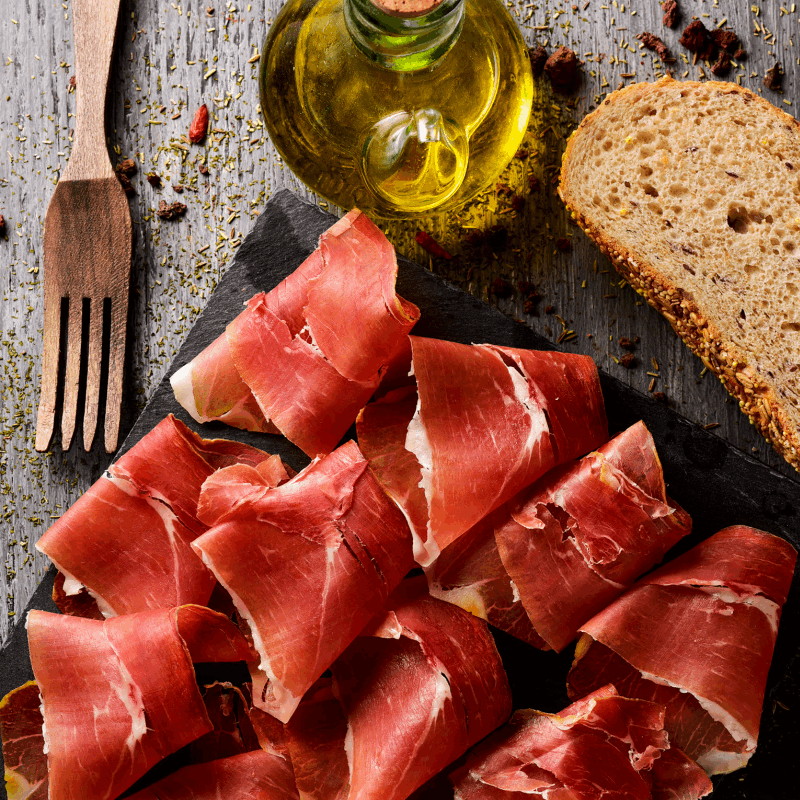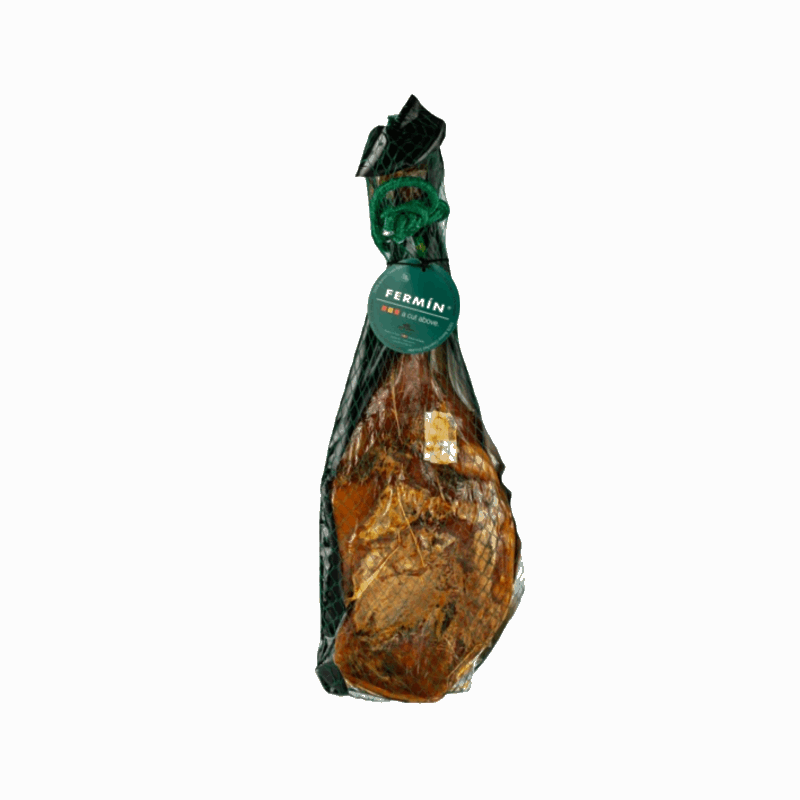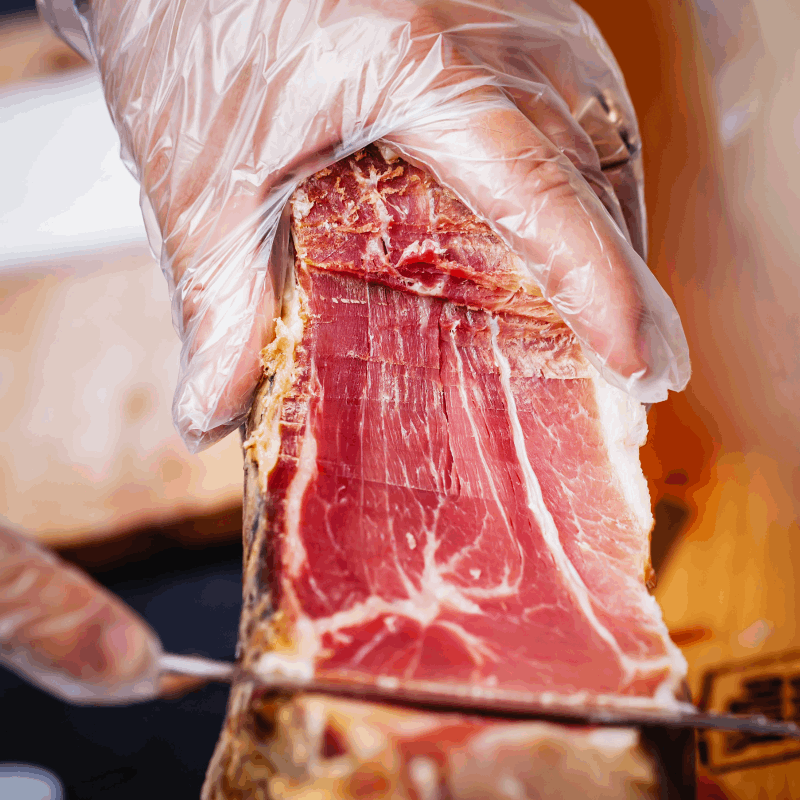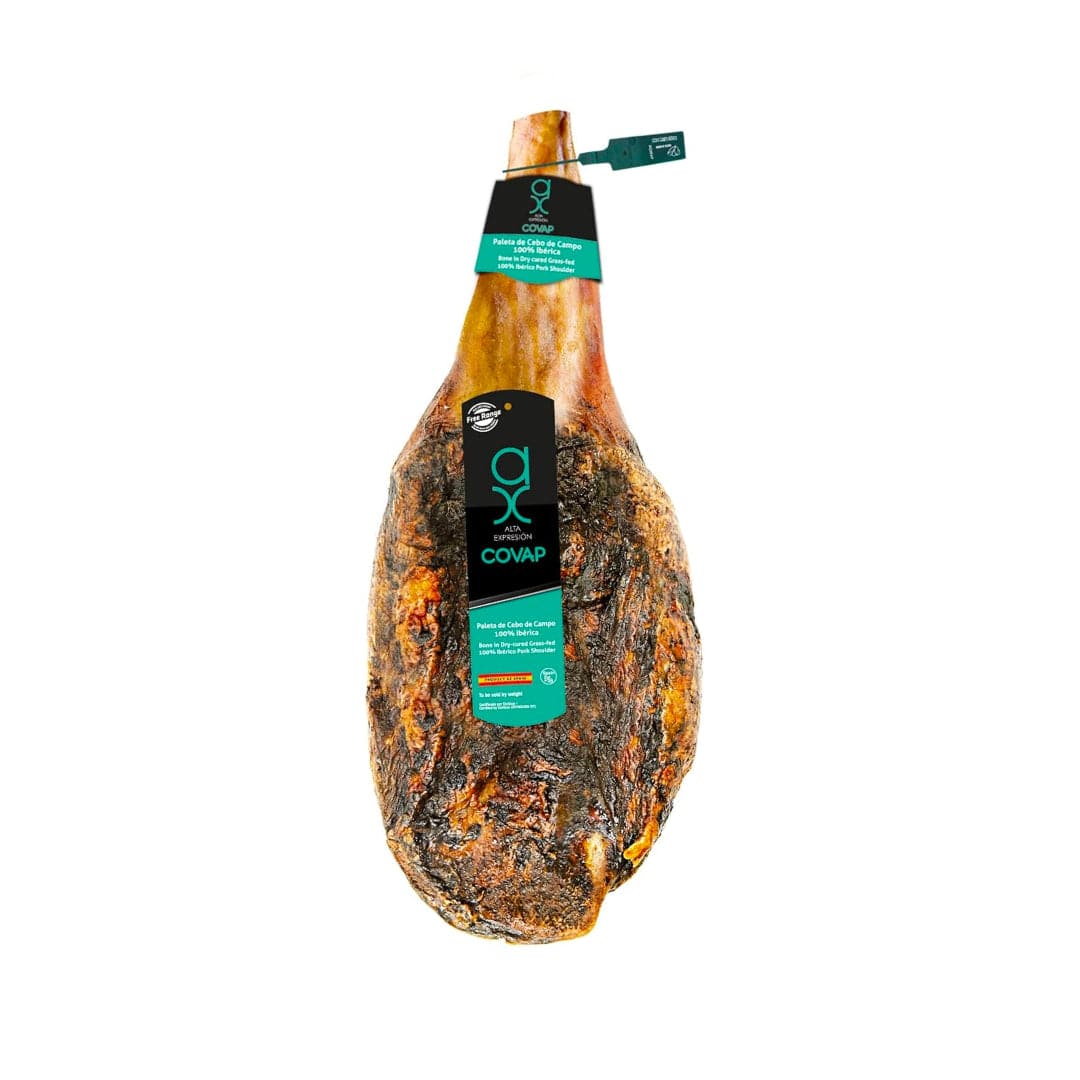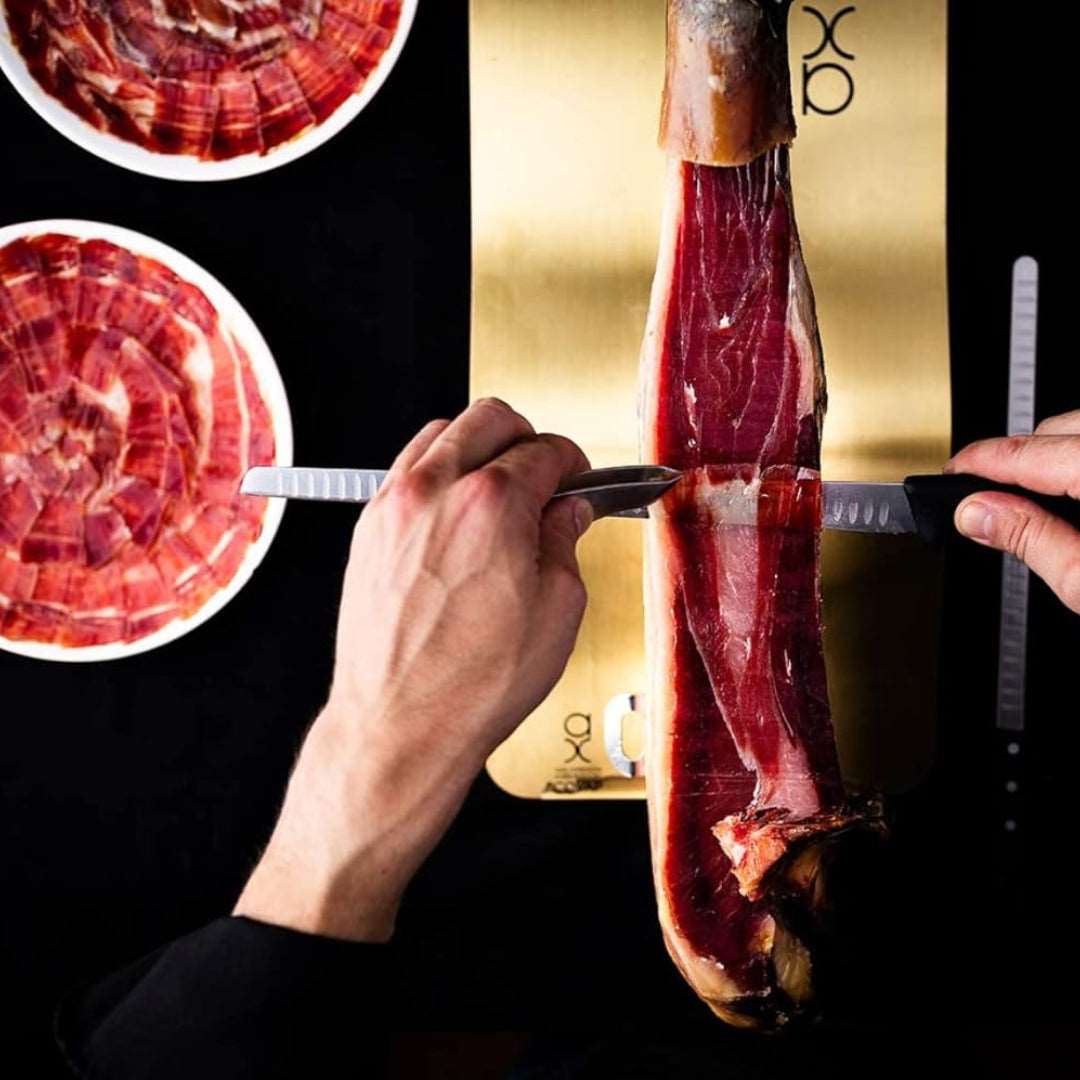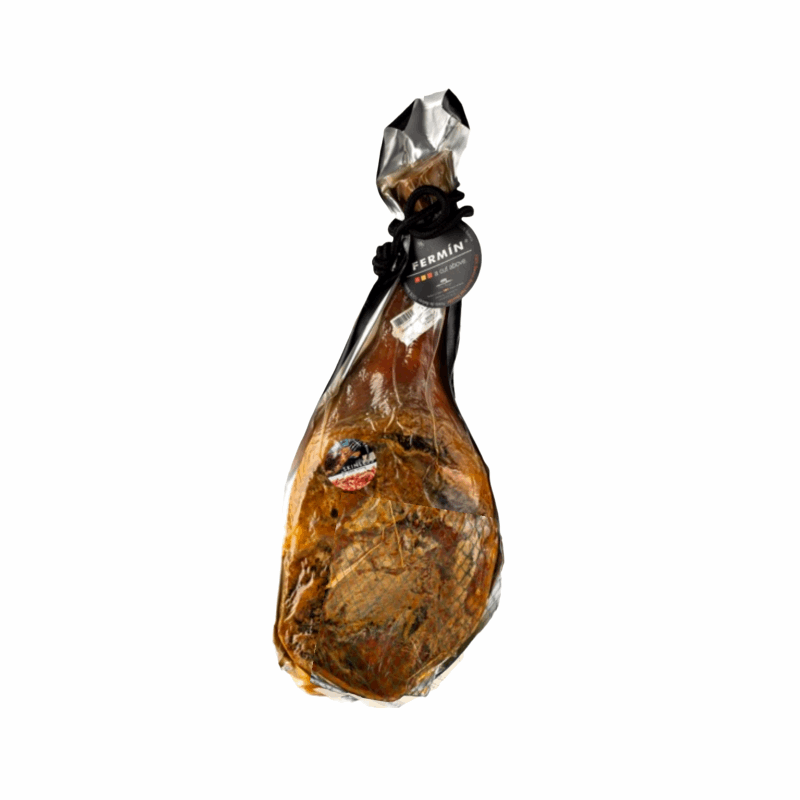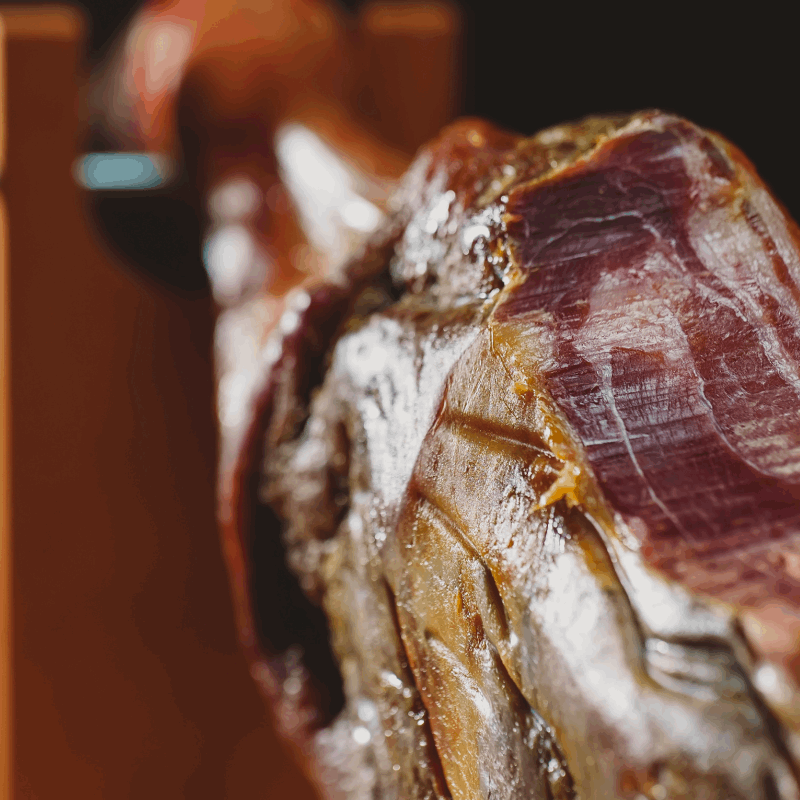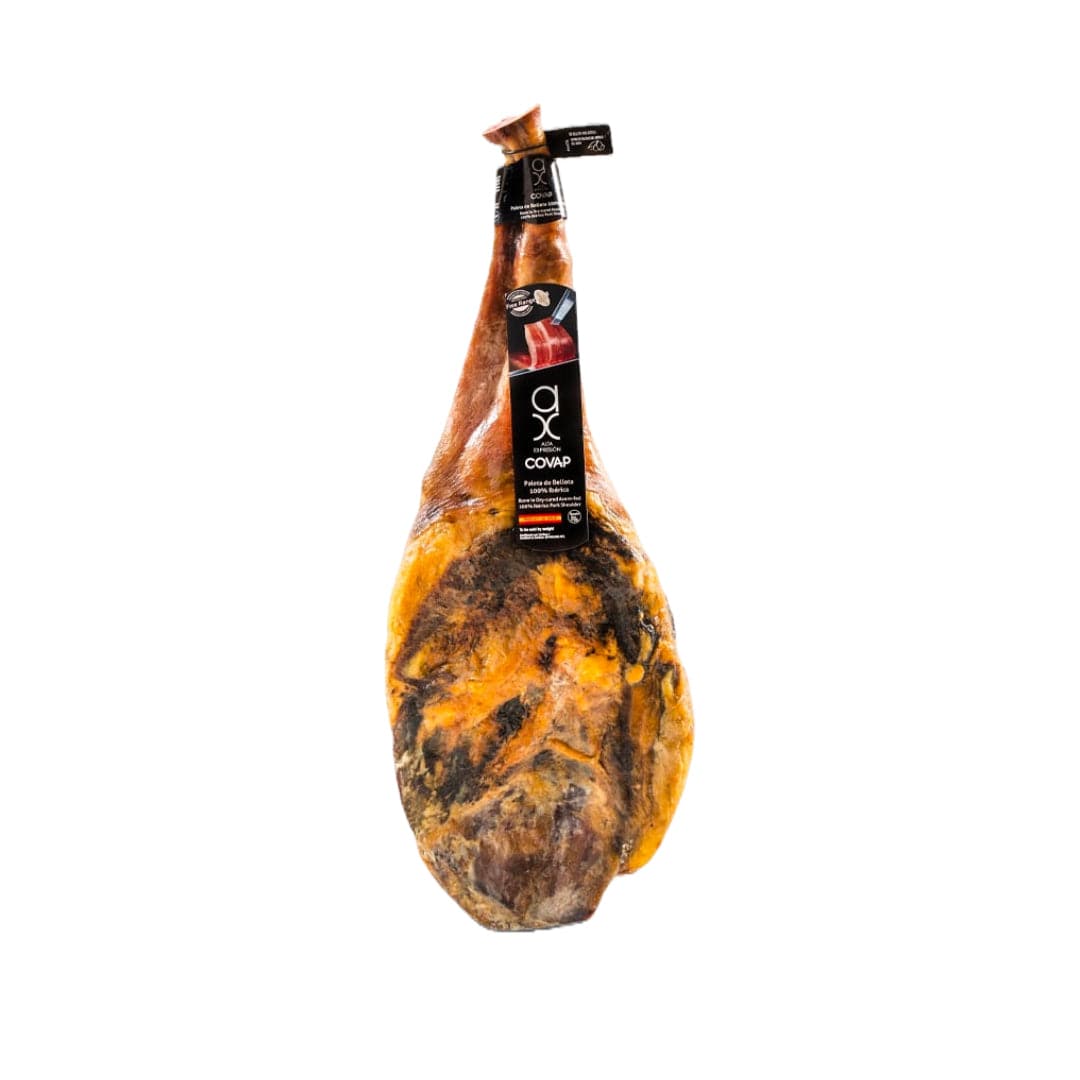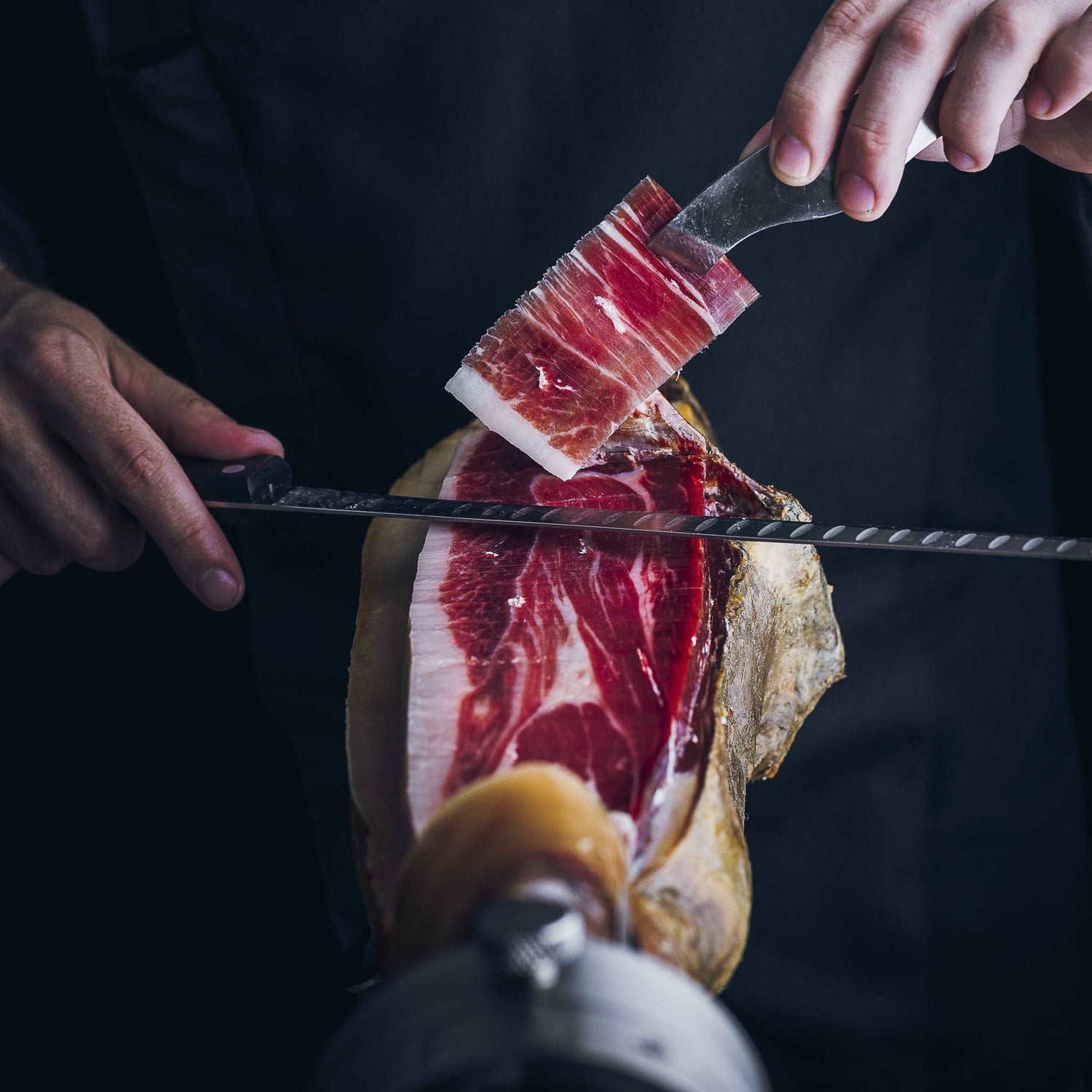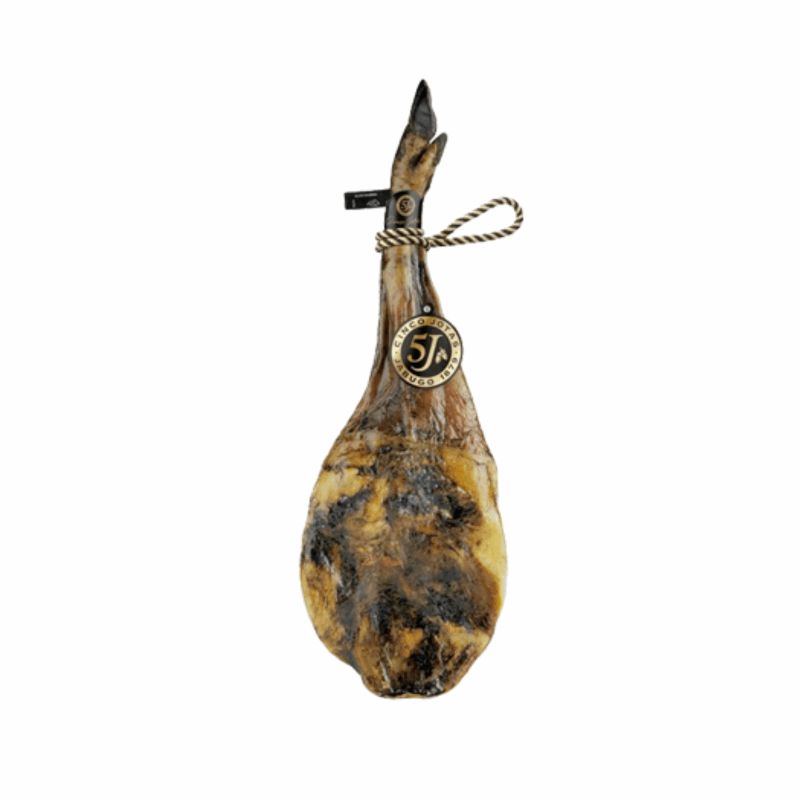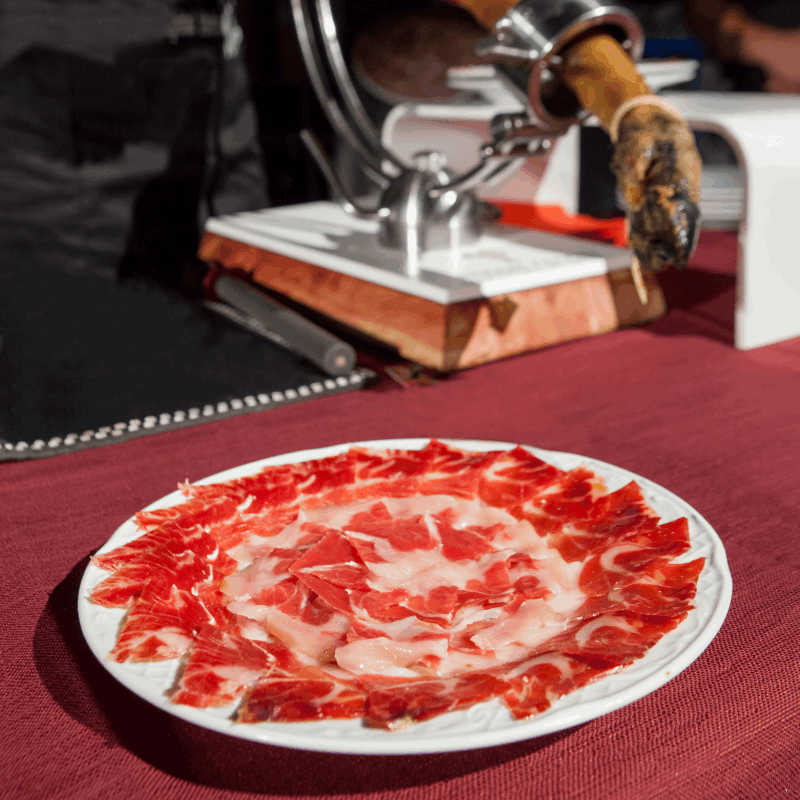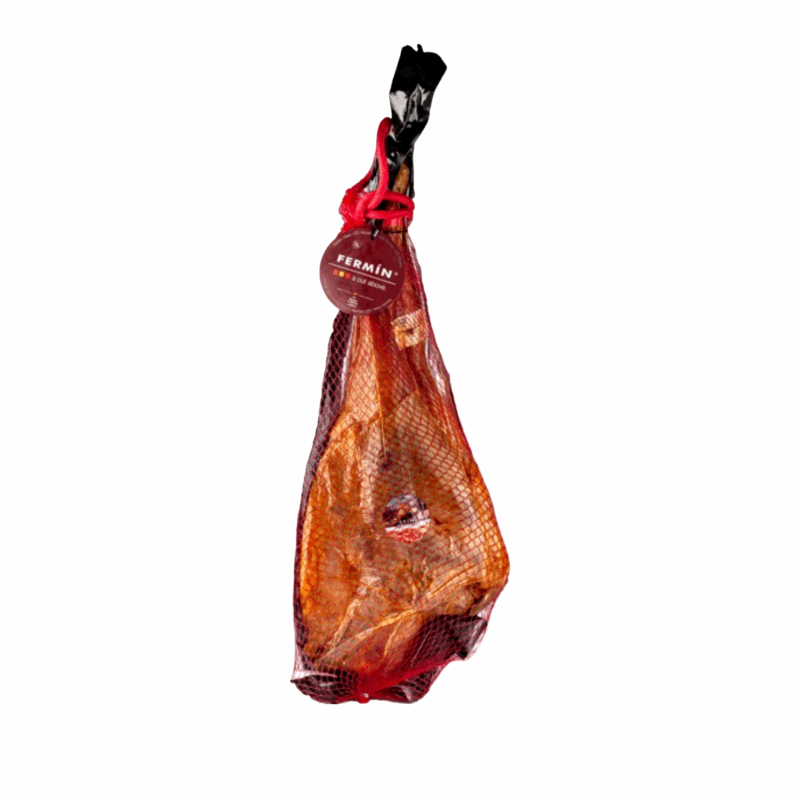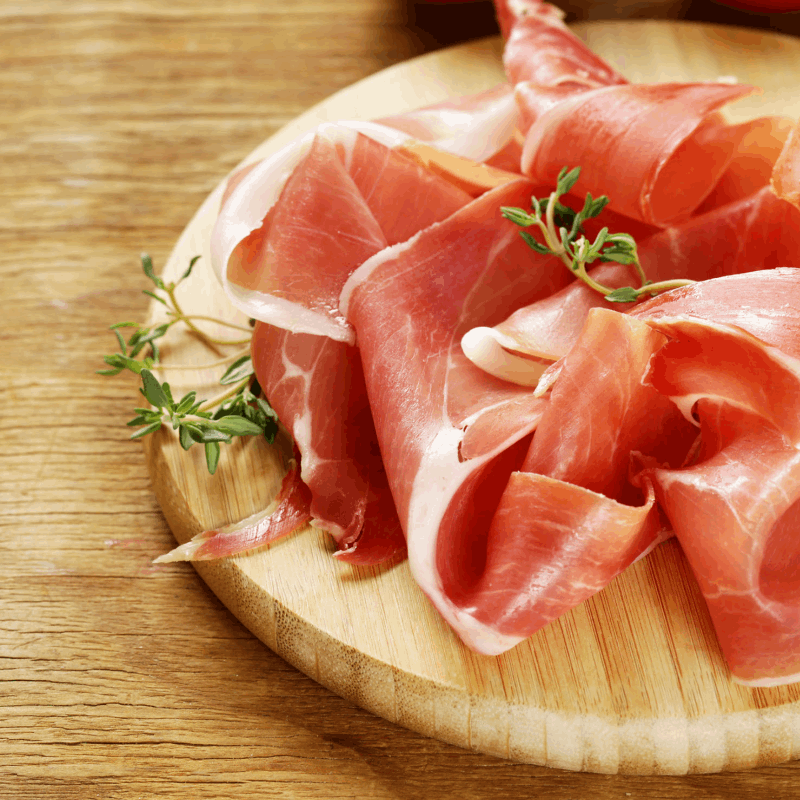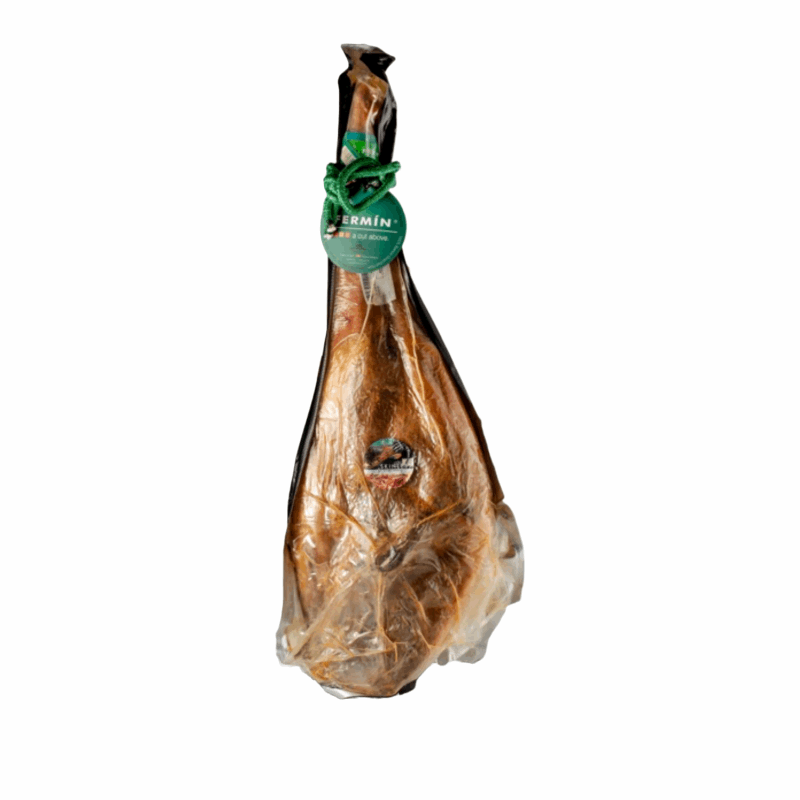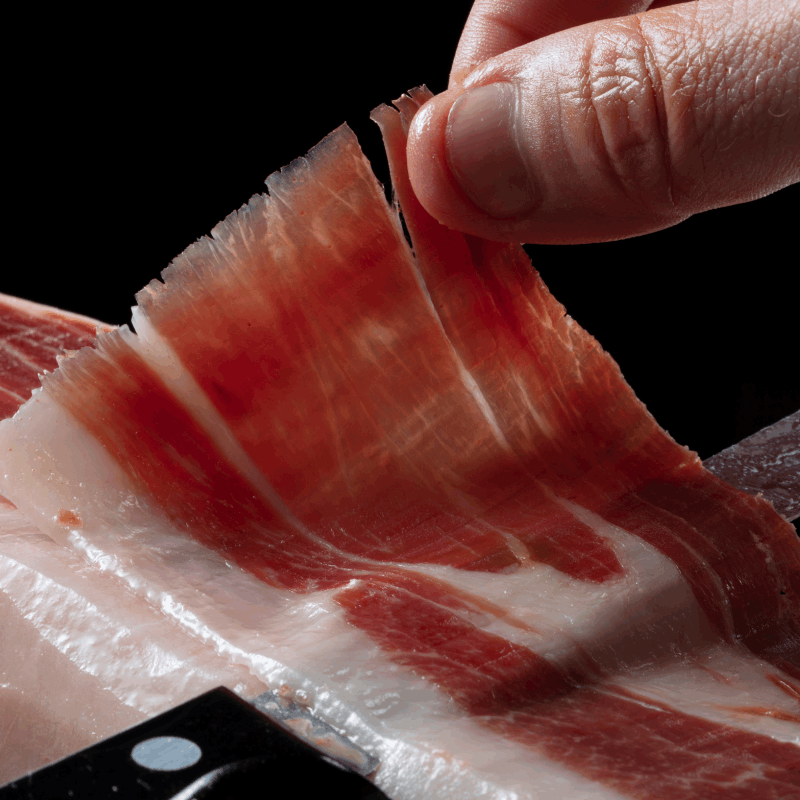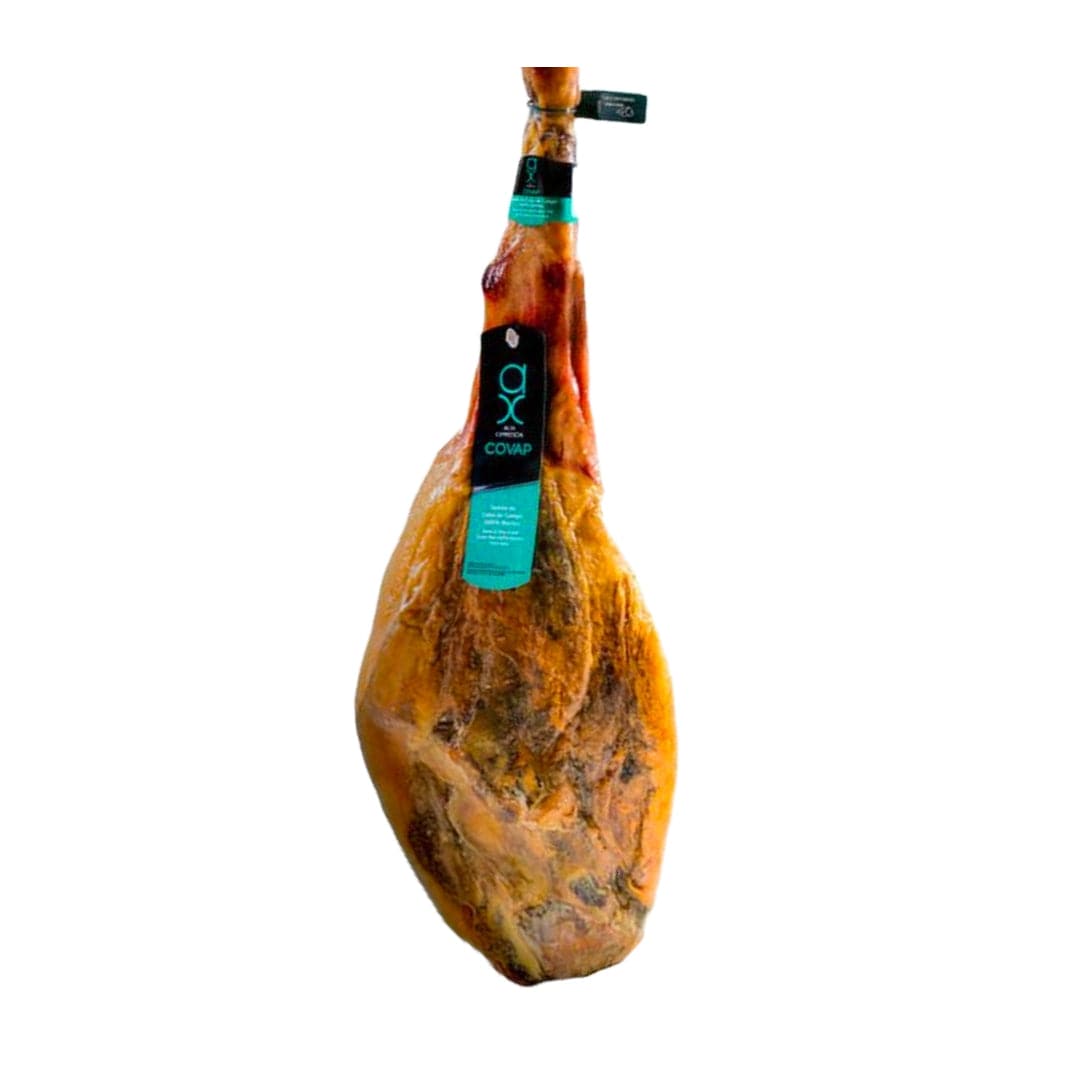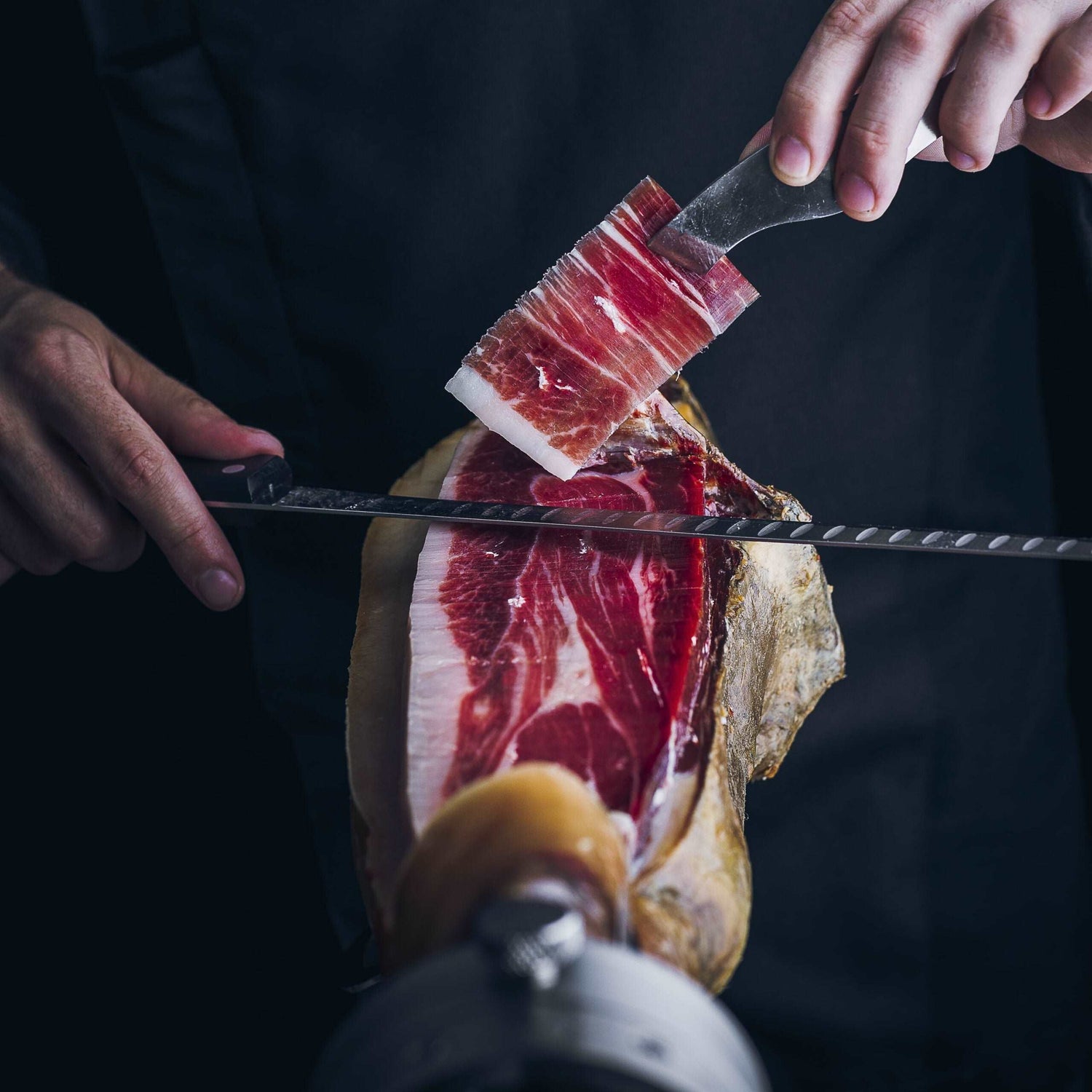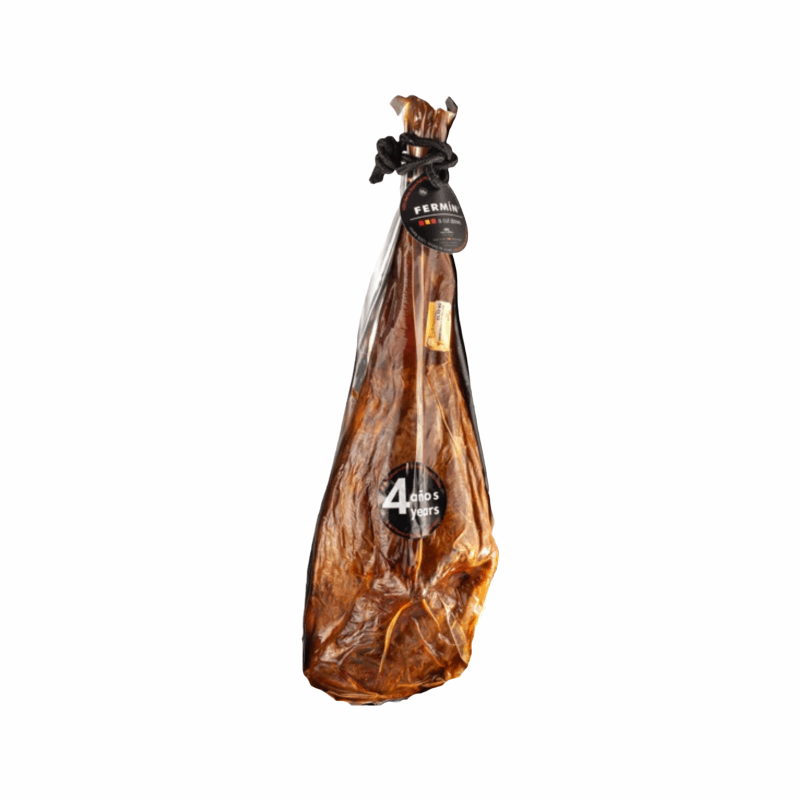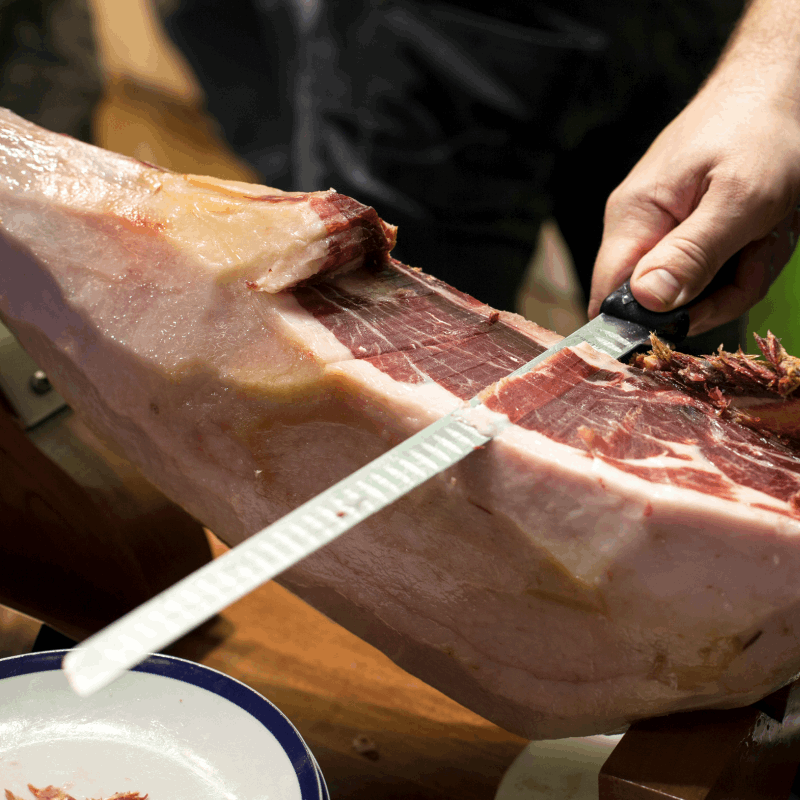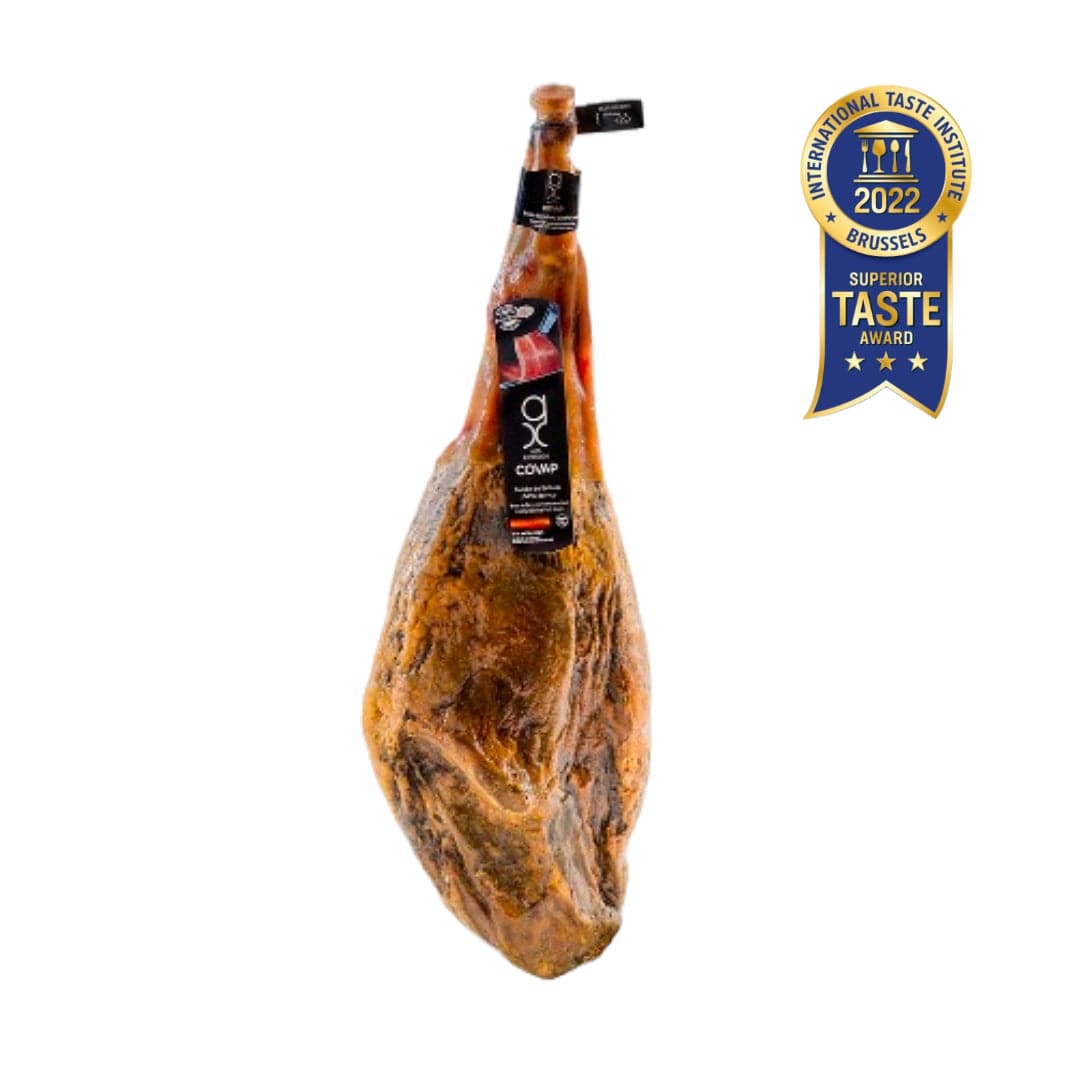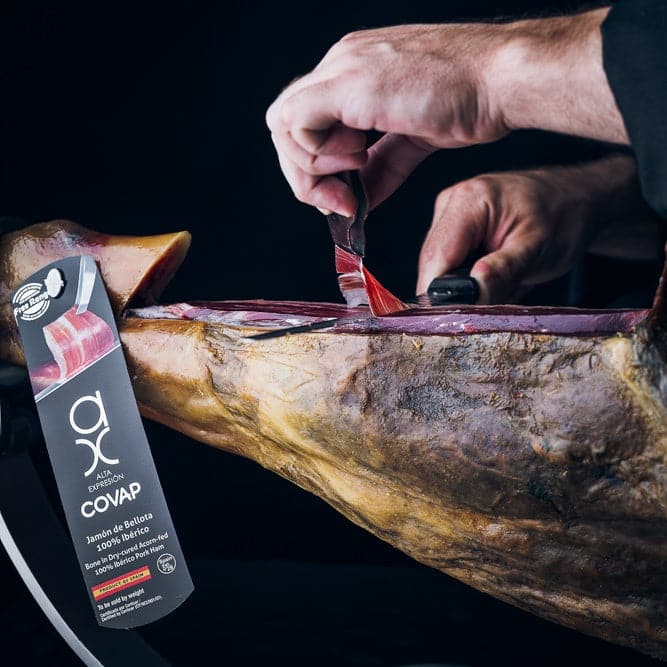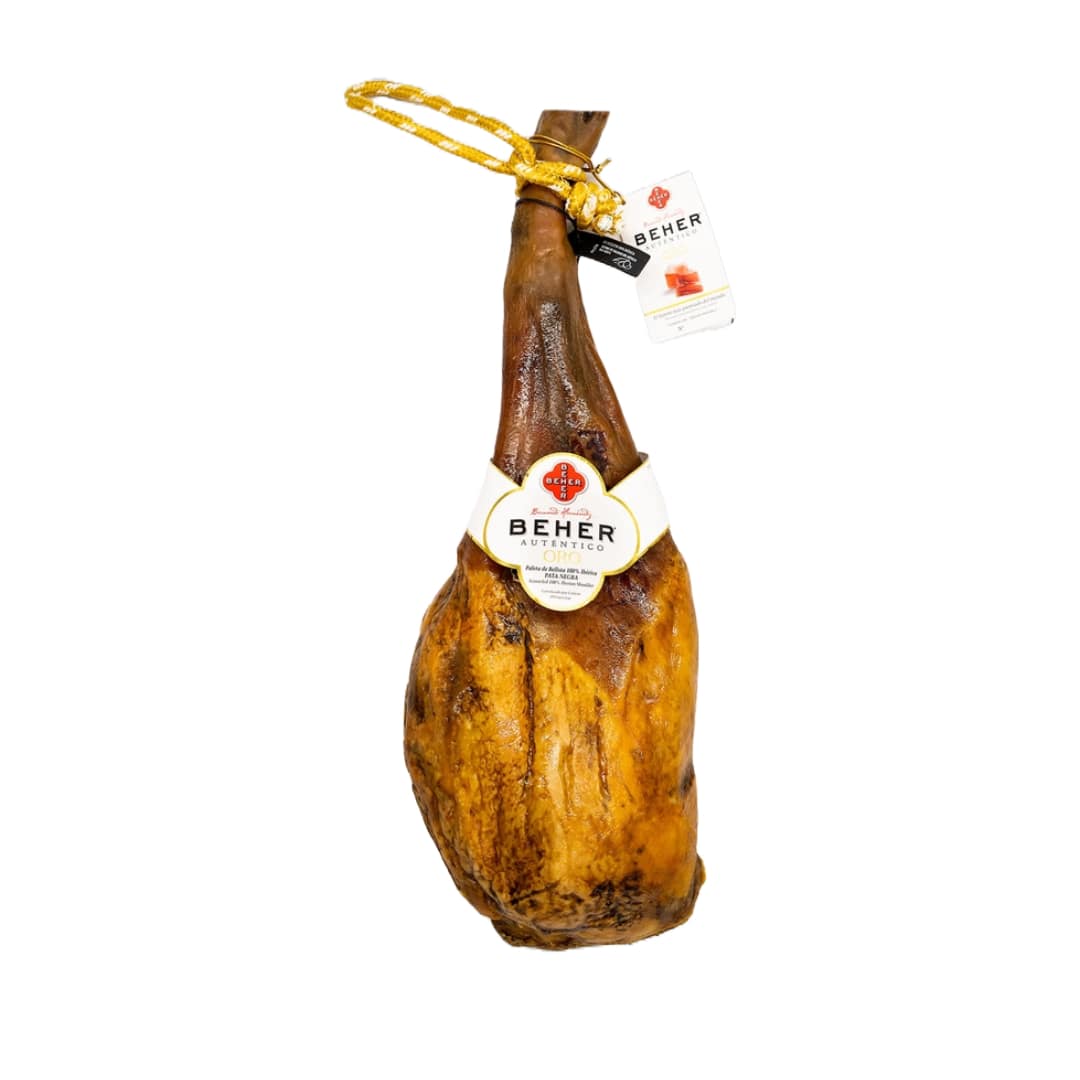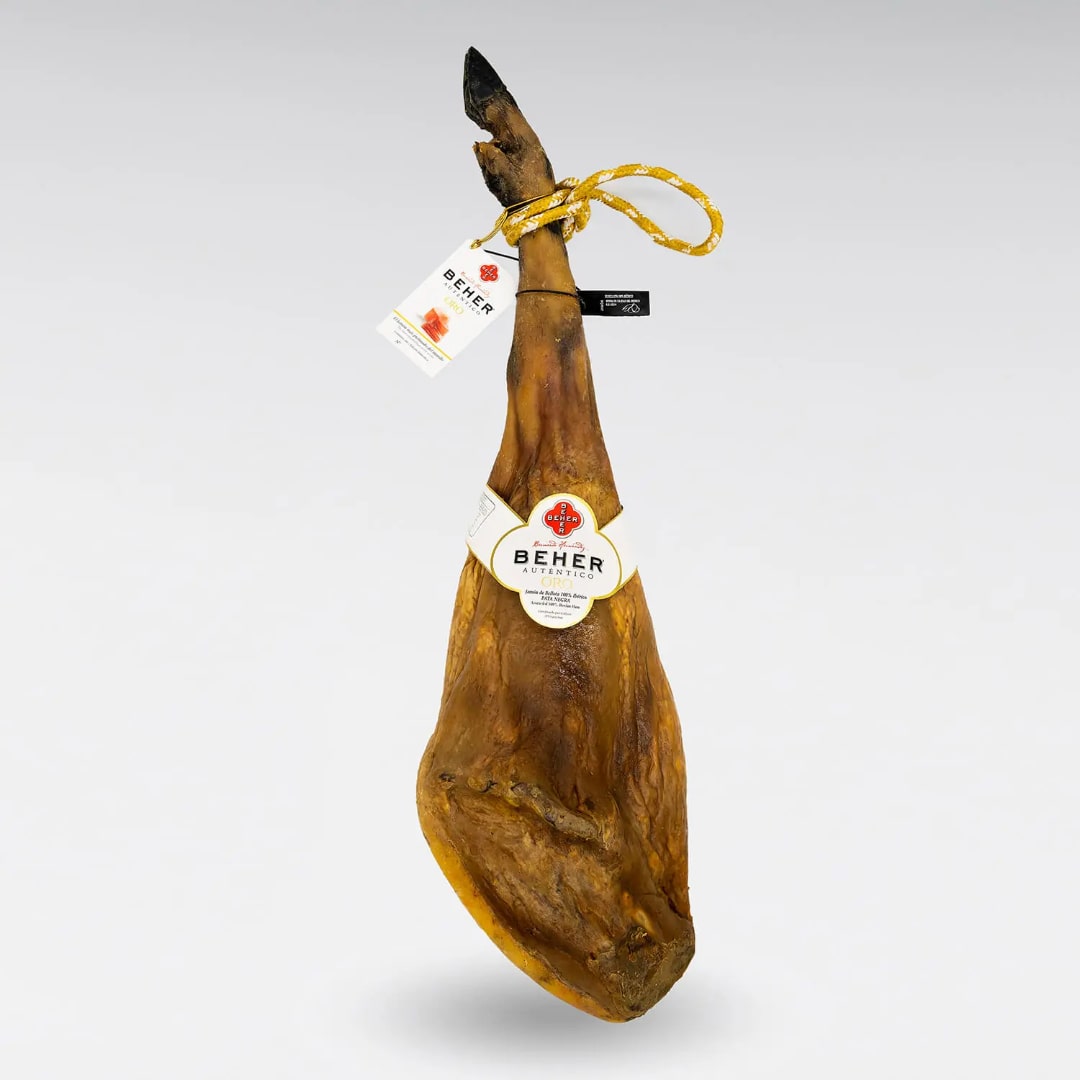14 productos
14 productos
Ordenar por:
Descubre la Tradición del Jamón Serrano con Hueso
Experimenta la rica tradición de la cocina española con nuestra Paleta de Jamón Serrano con Hueso de Fermin. Este jamón curado durante un mínimo de 18 meses destaca por su sabor intenso y textura tierna, ideal para cualquier ocasión que requiera un toque auténtico de la gastronomía mediterránea.
¿Por Qué Elegir la Paleta de Jamón Serrano Fermin?
- Procedente de Salamanca: Criado en condiciones ideales para un curado óptimo.
- Cerdos más pesados y grasos: Lo que aporta mejor marmoleado y sabor.
- Curación de 18 meses: El proceso de curado largo intensifica los sabores.
- Sabor Complejo: Textura firme y un sabor robusto y sabroso.
Paleta Serrana vs. Jamón Serrano
Paleta Serrana: Cortada delantera del cerdo, con más hueso y sabor más intenso debido a su mayor contenido graso y curación más corta. Jamón Serrano: Proveniente de la pata trasera, tiene un sabor más suave y una textura menos firme.
¿Cómo Cortar tu Paleta de Jamón Serrano?
Utiliza un soporte jamonero y un cuchillo jamonero para cortar finas lonchas paralelas al hueso. Sigue estos pasos:
- Coloca el jamón en el soporte de forma segura.
- Haz cortes suaves y uniformes, manteniendo la cuchilla afilada.
- Deja que las lonchas alcancen la temperatura ambiente para disfrutar de todo su sabor.
Disfruta la Paleta de Jamón Serrano Fermin
Esta Paleta de Jamón Serrano con Hueso es versátil y perfecta para cualquier plato:
- Sola: Ideal para saborear los sabores intensos del jamón.
- En una Tabla de Charcutería: Combínala con queso Manchego, aceitunas y pan crujiente.
- En Recetas: Añádela a tortillas, sopas o ensaladas para un toque mediterráneo.
Características Clave
- Auténtico Sabor Español: Cada loncha refleja la verdadera gastronomía española.
- Curado Tradicional: 18 meses para alcanzar un sabor óptimo.
- Versátil: Ideal para tapas, comidas elegantes o reuniones informales.
Compra la Paleta de Jamón Serrano con Hueso Fermin Online en EE.UU.
¿Listo para disfrutar del auténtico sabor del jamón serrano español? Compra la Paleta de Jamón Serrano con Hueso Fermin en Iberico Taste y disfruta de un envío rápido y seguro en todo EE.UU. Ya sea para una tabla de charcutería, una noche de tapas o un regalo gourmet, esta paleta te traerá los sabores tradicionales de España directamente a tu hogar.
Descubre el Exquisito Sabor de la Paleta Ibérica de Bellota Entera de Fermin
Disfruta del excepcional sabor de la Paleta Ibérica de Bellota Entera de Fermin, una joya de la gastronomía española. Proveniente de cerdos 100% ibéricos criados en las dehesas de La Alberca, Salamanca, estos cerdos, alimentados de forma natural, desarrollan una carne veteada de alta calidad con un perfil de sabor único. Perfecto para los amantes de los embutidos gourmet, esta paleta lleva el auténtico sabor de España a tu mesa.
¿Por Qué Elegir la Paleta Ibérica de Bellota Entera de Fermin?
- Cerdos 100% de raza ibérica criados en libertad en La Alberca.
- Curado tradicionalmente durante más de 24 meses en bodegas naturales.
- Rico en ácido oleico, grasas saludables y nutrientes esenciales.
- Producto 100% natural, sin aditivos artificiales.
Una Sinfonía de Sabores y Texturas
Cada loncha de la Paleta Ibérica de Bellota de Fermin revela una textura tierna y suculenta, con una combinación armónica de notas dulces y saladas. Con un toque de bellotas y matices terrosos, el perfil de sabor complejo de esta paleta crea una experiencia culinaria única. La grasa veteada mejora la jugosidad y profundidad del sabor, convirtiéndola en un elemento destacado para cualquier tabla de charcutería o surtido de tapas.
Proceso de Curación Tradicional para una Calidad Superior
Nuestra Paleta Ibérica de Bellota se cura durante un mínimo de 24 meses en bodegas naturales, donde pasa por un meticuloso proceso de envejecimiento que resalta sus sabores intensos y su textura tierna. Este método tradicional permite que la paleta alcance su máxima calidad, resultando en una exquisita delicadeza española que encarna la esencia de la charcutería ibérica.
Beneficios para la Salud y Naturalidad
- Rico en ácido oleico, grasas saludables que favorecen la salud cardiovascular.
- Alto contenido en proteínas, esencial para la salud muscular.
- Bajo en grasas saturadas, complementando perfectamente la dieta mediterránea.
Cómo Cortar Tu Paleta Ibérica de Bellota
Cortar una paleta ibérica es una experiencia gratificante que te permite disfrutar cada bocado en su máximo esplendor. Con las herramientas adecuadas y un poco de práctica, podrás cortar como un profesional. Necesitarás:
- Jamonero: Para mantener la paleta estable y segura durante el corte.
- Cuchillo jamonero: Diseñado para lograr lonchas finas y uniformes.
- Chaira: Para mantener el cuchillo afilado y cortes precisos.
Maridajes Perfectos para una Experiencia Española Auténtica
La Paleta Ibérica de Bellota de Fermin es una adición versátil a cualquier surtido gourmet, maridando perfectamente con una variedad de alimentos y bebidas españolas. Aquí te ofrecemos algunas sugerencias de maridaje:
- Quesos Españoles: Combínalo con queso manchego o quesos artesanales para complementar los sabores del jamón.
- Vinos Españoles: Sírvelo con un vaso de Rioja, Ribera del Duero o un buen Jerez.
- Tabla de Tapas: Inclúyelo en una selección de tapas con aceitunas, almendras y pan crujiente para una auténtica experiencia española.
Compra la Paleta Ibérica de Bellota Entera de Fermin Online en EE.UU.
¿Listo para disfrutar del verdadero sabor del Jamón Ibérico? Ordena la Paleta Ibérica de Bellota Entera de Fermin online en Ibérico Taste y disfruta de un envío rápido y confiable en todo Estados Unidos. Perfecto para ocasiones especiales, entusiastas gourmet o como un regalo lujoso, esta paleta ibérica premium es imprescindible para quienes buscan lo mejor de la gastronomía española.
Descubre el Auténtico Sabor de la Paleta Ibérica con Hueso de Covap
Disfruta de los exquisitos sabores de nuestra Paleta Ibérica con Hueso de Covap, una verdadera obra maestra de la gastronomía española. Elaborada por Covap, uno de los productores más prestigiosos de España, esta paleta ibérica de alta calidad representa la rica herencia de la dehesa y la auténtica gastronomía tradicional española, trayendo los sabores de Córdoba directamente a tu mesa.
Procedente de Cerdos Ibéricos de Campo Criados en Los Pedroches, Córdoba
Nuestra Paleta Ibérica se obtiene de cerdos 100% ibéricos criados en libertad en los pastos de Los Pedroches, Córdoba. Estos cerdos, alimentados con una dieta diversa que incluye bellotas, hierbas y granos, resultan en un producto con un sabor complejo y un marmoleado superior.
Una Sinfonía de Sabor y Textura
Con cada loncha, disfrutarás de una textura suave que se derrite en la boca, impregnada de notas dulces de bellota, miel y sutiles toques a trufa. Esta armonía de sabores convierte esta paleta ibérica en una delicia imprescindible para cualquier amante de la gastronomía gourmet española.
Curada Tradicionalmente Durante 18 Meses
Esta Paleta Ibérica de Covap se cura durante un mínimo de 18 meses en secaderos naturales utilizando métodos tradicionales. Este proceso mejora los sabores naturales y asegura un producto de calidad superior con un sabor profundo y una textura tierna.
¿Por Qué Elegir la Paleta Ibérica con Hueso de Covap?
- Cerdos Ibéricos Criados en Libertad: Proveniente de cerdos 100% ibéricos que pastan en Los Pedroches.
- Alimentación con Bellotas y Pasto: Alimentados con hierbas y bellotas, lo que resulta en un marmoleado superior.
- Proceso de Curación Tradicional: Curada durante más de 18 meses para obtener un sabor intenso y equilibrado.
- Producto Natural de Alta Calidad: Rico en vitaminas y antioxidantes naturales, libre de aditivos artificiales.
Cómo Lonchear tu Paleta Ibérica con Hueso de Covap
Lonchear tu paleta ibérica es más fácil de lo que parece. Solo necesitas las herramientas adecuadas:
- Un Jamonero Resistente: Mantiene la paleta estable.
- Un Cuchillo Jamonero Largo y Flexible: Ideal para hacer lonchas finas y uniformes.
- Chaira: Mantén tu cuchillo afilado para cortes suaves.
Paso 1: Coloca la paleta en el jamonero con la pezuña hacia arriba.
Paso 2: Comienza a lonchear con movimientos suaves y firmes.
Paso 3: Sirve las lonchas a temperatura ambiente para disfrutar al máximo de su sabor.
Maridajes Perfectos para una Experiencia Española Auténtica
- Quesos Españoles: Acompáñala con queso Manchego o quesos artesanales.
- Vinos Españoles: Un Rioja o Ribera del Duero son el complemento perfecto.
- Selección de Tapas: Inclúyela en una tabla de tapas con aceitunas, pan crujiente y aceite de oliva virgen extra.
Compra la Paleta Ibérica con Hueso de Covap Online en USA
¿Listo para llevar los lujosos sabores de España a tu hogar? Compra la Paleta Ibérica con Hueso de Covap online en Iberico Taste y disfruta de un envío rápido y confiable en todo Estados Unidos. Perfecta para ocasiones especiales o como un regalo gourmet, esta paleta es un imprescindible para los amantes de la gastronomía española.
Paleta Ibérica de Bellota Pata Negra de Fermin – Una Obra Maestra Culinaria
Nuestra Paleta de Jamón Ibérico de Bellota Pata Negra con Hueso de Fermin es un producto excepcional que proviene de la pata delantera de cerdos 100% ibéricos criados en libertad. Esta raza autóctona de España es conocida por su calidad insuperable. Durante la temporada de Montanera, de octubre a febrero, estos cerdos experimentan una transformación notable, duplicando su peso mientras se alimentan de una dieta rica en bellotas y pastos en la dehesa, lo que da como resultado la paleta más fina y prestigiosa del mundo.
Curada durante un mínimo de 26 meses mediante métodos artesanales en La Alberca, España, una Reserva Natural declarada Patrimonio de la Humanidad, esta Paleta de Bellota representa la cúspide de la excelencia gourmet.
Este manjar de la charcutería española es una fuente rica en proteínas y ácidos grasos omega-3.
¿Qué necesito para cortar mi jamón?
A pesar de lo que puedas pensar, cortar una pata de jamón no es difícil. Todo lo que necesitas es un soporte para jamón, un cuchillo especial para cortar jamón y un poco de práctica, ¡y listo!
Paleta vs Jamón
La Paleta es la pata delantera del cerdo. Es más pequeña, con menos grasa y más hueso. Su sabor es menos jugoso pero más intenso en comparación con el jamón, que proviene de la pata trasera.
Una auténtica delicia para tu paladar. Así describiríamos nuestra Paleta 100% Ibérica de Bellota de Covap. Con un sabor sencillamente espectacular, este jamón Pata Negra se elabora a partir de cerdos 100% ibéricos criados en libertad en la dehesa, con una alimentación natural a base de bellota.
Cada pieza pasa por un extenso proceso de crianza en nuestras propias bodegas naturales durante un mínimo de 18 meses. Esto asegura su excelente sabor y su intenso aroma, acentuado por el característico veteado resultante de la alimentación del cerdo a base de bellota.
Ideal para los amantes de los embutidos españoles de primera calidad, cada loncha de esta pata de Jamón Ibérico es una verdadera delicia que captura la esencia del rico patrimonio culinario español.
¿Qué necesito para lonchear mi Paleta Ibérica de Bellota?
A pesar de lo que se pueda pensar, cortar una pata de jamón no es difícil. Sólo necesitas un jamonero, un cuchillo jamonero y un poco de práctica, ¡eso es todo!.
Paleta vs Jamón
La paleta es la pata delantera del cerdo. Es más pequeña, con menos grasa y más hueso. Su sabor es menos jugoso pero más intenso.
Descubre el Exquisito Sabor de la Paleta Ibérica de Bellota de Cinco Jotas
Experimenta el sabor lujoso de la Paleta Ibérica de Bellota con Hueso de Cinco Jotas (5J), una de las productoras más reconocidas de jamón ibérico en España. Esta paleta proviene de cerdos 100% ibéricos de pura raza, criados en libertad y alimentados con bellotas en las dehesas, lo que aporta un sabor único y una textura marmoleada.
¿Por Qué Elegir la Paleta Ibérica de Bellota de Cinco Jotas?
- Cerdos 100% ibéricos criados en libertad.
- Alimentados con bellotas durante la montanera, lo que enriquece el sabor y el contenido en ácidos oleicos.
- Textura marmoleada que se derrite en la boca.
- Sabor profundo y complejo con notas a frutos secos.
Paleta Ibérica vs. Jamón Serrano – ¿Cuál es la Diferencia?
La Paleta Ibérica de Bellota proviene de los hombros del cerdo ibérico, con un tamaño menor y un contenido de grasa más alto, lo que proporciona un sabor más jugoso. En comparación, el Jamón Serrano se elabora generalmente con razas de cerdo blanco, es más magro y su sabor es menos complejo.
Cómo Cortar la Paleta Ibérica con Hueso
Para cortar una paleta correctamente, necesitarás:
- Un jamonero que mantenga la estabilidad de la pieza.
- Un cuchillo jamonero largo y flexible para realizar cortes finos y uniformes.
- Una chaira para mantener el filo del cuchillo.
Experiencia de Sabor y Textura
La Paleta Ibérica Cinco Jotas ofrece un equilibrio de notas dulces y a frutos secos, con una textura sedosa que se deshace en la boca. Perfecta para tapas o tablas de embutidos, acompañada de queso Manchego, aceitunas y un vino tinto Rioja.
Compra Paleta Ibérica de Bellota Cinco Jotas Online en EE.UU.
Ordena la Paleta Ibérica con Hueso de Cinco Jotas en Ibérico Taste y disfruta de una entrega rápida y segura en EE.UU. Perfecta para tapas, tablas de embutidos o como regalo gourmet.
Descubre el Sabor Tradicional del Jamón Serrano Español
Experimenta el rico sabor del Jamón Serrano Español de Fermin, el embutido más icónico de España. Elaborado cuidadosamente con carne de cerdo de primera calidad, este jamón es curado y envejecido según métodos tradicionales, que han convertido al Jamón Serrano en un clásico de la cocina española. Cada loncha ofrece una deliciosa mezcla de sabores suaves y salados, con una textura delicada que lo hace perfecto para cualquier ocasión.
¿Por Qué Elegir Jamón Serrano de Fermin?
- Elaborado con Carne de Cerdo Serrano Premium: Seleccionado de razas de cerdos blancos, como Duroc y Large White, para asegurar un sabor superior y una textura perfecta.
- Proceso de Curación Tradicional: Curado y envejecido a la perfección siguiendo las tradiciones españolas.
- Beneficios Nutricionales: Rico en minerales y proteínas, es una excelente fuente de nutrientes esenciales para la salud muscular y cerebral.
Jamón Serrano vs. Jamón Ibérico – ¿Cuál es la Diferencia?
Jamón Serrano: Elaborado a partir de razas de cerdos blancos como Duroc, este jamón se cura principalmente con sal, lo que resulta en un sabor suave y una textura firme. Su tiempo de curación es más corto en comparación con el Jamón Ibérico, lo que lo convierte en una opción versátil para aquellos que disfrutan de un sabor más ligero.
Jamón Ibérico: Proviene de cerdos ibéricos de pura raza, conocidos por su capacidad única de infiltrar grasa en el músculo. A menudo criados en la dehesa y alimentados con bellotas, ofrecen un sabor más rico y complejo con una textura delicada y marmoleada.
¿Cómo Cortar tu Jamón Serrano?
Cortar tu pierna completa de Jamón Serrano es más fácil de lo que parece. Para obtener los mejores resultados, necesitarás:
- Soporte para Jamón Serrano: Mantiene el jamón estable durante el corte.
- Cuchillo Jamonero Especial: Utiliza un cuchillo largo y flexible diseñado específicamente para cortar lonchas finas y uniformes.
- Chaira: Mantén tu cuchilla afilada para lograr cortes limpios.
Con el equipo adecuado y un poco de paciencia, ¡estarás cortando tu jamón serrano como un profesional en poco tiempo!
Sabor y Textura – Un Clásico Español Verdadero
El sabor del Jamón Serrano Fermin se caracteriza por sus notas suaves y saladas, con un ligero dulzor que equilibra a la perfección. El proceso de curación más corto preserva los sabores naturales del cerdo, mientras que el envejecimiento experto le da una textura firme pero tierna. Este jamón es perfecto para disfrutar solo, servido como parte de una tabla de embutidos o acompañado de pan crujiente, aceitunas españolas y queso Manchego.
Ideal para Tablas de Charcutería, Tapas y Uso Diario
Nuestro Jamón Serrano Español de Fermin es ideal para crear tapas españolas auténticas o añadir a tu tabla de embutidos. Combínalo con aceitunas españolas, quesos curados y una copa de vino tinto Tempranillo o Rioja para disfrutar de todo su sabor. Su sabor suave y accesible lo convierte en una opción versátil para disfrutar a diario, ya sea en lonchas finas o cortado en cubos pequeños.
Compra Jamón Serrano Español Auténtico Online en EE.UU.
¿Listo para disfrutar del verdadero sabor del Jamón Serrano Español? Compra online el Jamón Serrano de Fermin en Iberico Taste y recíbelo directamente en tu hogar en EE.UU. Perfecto para tablas de charcutería, tapas españolas o como un regalo gourmet, este clásico jamón serrano trae los sabores auténticos de España directamente a tu mesa.
Descubre el Exquisito Sabor del Jamón Ibérico con Hueso de Fermin
Nuestro Jamón Ibérico con Hueso de Fermin está elaborado a partir de cerdos ibéricos de pura raza, reconocidos por su capacidad única de infiltrar grasa saludable en el músculo, creando una textura marmoleada que realza tanto el sabor como la ternura. Criados en condiciones de libertad, estos cerdos disfrutan de una dieta natural de granos, hierbas, raíces y hierbas, lo que contribuye a la máxima calidad de este jamón ibérico. Curado durante un mínimo de 34 meses utilizando métodos tradicionales en La Alberca, una región en España conocida por su entorno prístino y declarada Reserva Natural y Patrimonio de la Humanidad, cada pata de jamón ofrece una experiencia excepcional de sabor a Jamon Ibérico.
¿Por Qué Elegir el Jamón Ibérico con Hueso de Fermin?
- Cerdos Ibéricos de Pura Raza: Procedente de los mejores cerdos ibéricos, criados por su calidad superior y sabor rico.
- Estilo de Vida Libre: Los cerdos viven en libertad, disfrutando de una dieta natural que mejora el perfil de sabor y la marmoleada de la carne.
- Largo Proceso de Curación: Curado durante más de 34 meses con métodos artesanales en La Alberca, una región famosa por producir jamones españoles de primera calidad.
- Sabor y Textura Incomparables: La grasa marmoleada se derrite suavemente en el músculo, creando una textura suculenta y que se deshace en la boca.
Jamón Ibérico de Cebo Alimentado con Granos vs. Jamón Ibérico de Bellota
Conocer las diferencias entre el Jamón Ibérico de Cebo y el Jamón Ibérico de Bellota es clave para elegir el jamón adecuado para tus necesidades:
Jamón Ibérico de Cebo: Este tipo de jamón ibérico proviene de cerdos alimentados principalmente con cereales y granos. Tiene un sabor delicioso y salado, pero con menos complejidad en comparación con el Bellota. Ideal para quienes buscan un jamón ibérico de alta calidad con un perfil más magro.
Jamón Ibérico de Bellota: Elaborado con cerdos alimentados con bellotas que pastan libremente durante la temporada de montanera. Esta dieta resulta en un sabor más intenso, con notas dulces y a nueces, y una textura marmoleada que se derrite en la boca, ofreciendo una experiencia más rica y tierna.
¿Cómo Cortar tu Jamón Ibérico con Hueso?
Cortar una pierna entera de jamón ibérico es más fácil de lo que parece con las herramientas adecuadas y un poco de práctica. Para lograr las lonchas finas perfectas, necesitarás:
- Soporte para Jamón (Jamonero): Proporciona estabilidad y seguridad durante el corte.
- Cuchillo Jamonero Largo y Flexible: Ideal para lograr cortes finos y precisos.
- Chaira: Mantén tu hoja afilada para cortes limpios a través de la carne marmoleada.
Sabor y Textura - Una Verdadera Experiencia Gourmet
El sabor del Jamón Ibérico con Hueso de Fermin es rico y complejo, combinando notas saladas, a nuez y terrosas con toques de hierbas naturales y granos de la dieta de los cerdos. La grasa marmoleada crea una textura jugosa y aterciopelada que se derrite delicadamente en el paladar, dejando un sabor inolvidable y duradero. Este jamón curado español es perfecto para disfrutar solo, como parte de una tabla de embutidos o en una variedad de platos gourmet.
Perfecto para Tablas de Charcutería y Tapas Gourmet
Ya sea servido como el centro de una tabla de charcutería española o acompañado de queso Manchego, aceitunas y una copa de vino tinto Rioja, el Jamón Ibérico con Hueso de Fermin ofrece un toque sofisticado a cualquier comida. Su rico y complejo sabor también lo convierte en un ingrediente ideal para recetas gourmet, añadiendo profundidad y elegancia a tu cocina.
Compra Jamón Ibérico con Hueso de Fermin Online en EE.UU.
¿Listo para experimentar el auténtico sabor del Jamón Ibérico? Compra online el Jamón Ibérico con Hueso de Fermin en Iberico Taste y disfruta de una entrega rápida y segura en todo EE.UU. Perfecto para tablas de charcutería, tapas españolas o como regalo gourmet, este jamón ibérico premium trae los sabores auténticos de las reservas naturales de España a tu mesa. Descubre por qué Fermin es reconocido como una marca líder de carne de cerdo ibérica y disfruta hoy del jamón español de la más alta calidad.
Descubre el Exquisito Sabor del Jamón 100% Ibérico de Cebo de Covap
Indulge en el rico sabor del Jamón 100% Ibérico de Cebo de Covap, elaborado a partir de cerdos 100% ibéricos criados en libertad. Estos cerdos se alimentan de los recursos naturales de la dehesa, lo que crea un jamón gourmet español con una profundidad y complejidad de sabor incomparables. Cada loncha de este jamón ibérico ofrece un equilibrio delicado de dulzura y salado, con una textura que se derrite en la boca, ofreciendo una experiencia de sabor inolvidable. Elaborado artesanalmente y curado a la perfección por Covap, este jamón eleva cualquier tabla de embutidos o selección de tapas españolas.
¿Por Qué Elegir el Jamón 100% Ibérico de Cebo de Covap?
- Cerdos 100% Ibéricos de Raza Pura: Seleccionados por su alta calidad y marmoleo superior.
- Criados en Libertad: Los cerdos se crían en la dehesa, lo que realza el sabor y la textura de la carne.
- Alimentación Natural: Los cerdos se alimentan de hierbas, pastos y piensos de alta calidad, lo que contribuye a un perfil de sabor complejo.
- Elaborado por Covap: Curado de manera natural utilizando métodos tradicionales, cada pata se supervisa para lograr su rica intensidad y aromas distintivos.
Jamón Ibérico de Cebo vs. Jamón Ibérico de Bellota
Conocer la diferencia entre Jamón Ibérico de Cebo y Jamón Ibérico de Bellota es clave para apreciar el sabor auténtico del jamón ibérico:
- Jamón Ibérico de Cebo: Proviene de cerdos alimentados principalmente con cereales y granos, ofreciendo un sabor más suave y una textura más magra.
- Jamón Ibérico de Bellota: Proviene de cerdos alimentados con bellotas durante la montanera, lo que resulta en un sabor más rico y una grasa que se derrite en la carne, haciéndola excepcionalmente tierna y aromática.
Cómo Lonchear el Jamón 100% Ibérico de Cebo
Para disfrutar plenamente de su sabor, lonchear correctamente es esencial. Necesitarás:
- Un Jamonero Resistente: Mantiene el jamón estable durante el corte.
- Cuchillo Jamonero Largo y Flexible: Ideal para obtener lonchas finas y precisas.
- Chaira: Para mantener el cuchillo afilado y garantizar cortes suaves.
Perfecto para Tablas de Embutidos y Tapas Gourmet
El Jamón 100% Ibérico de Cebo de Covap combina perfectamente con quesos como el Manchego, aceitunas y una copa de vino Tempranillo o Rioja. Su sabor complejo lo convierte en una adición versátil para platos gourmet o tapas auténticas españolas para ocasiones especiales.
Compra Jamón 100% Ibérico de Cebo de Covap Online en USA
¿Listo para disfrutar del auténtico sabor del jamón ibérico? Compra el Jamón 100% Ibérico de Cebo de Covap online en Iberico Taste y disfruta de un envío rápido y seguro en todo Estados Unidos. Ideal para tablas de embutidos, tapas españolas o como regalo gourmet, este jamón premium te trae los auténticos sabores de la dehesa española directamente a tu mesa.
Descubre el Exquisito Jamón Ibérico de Bellota Entero de Fermin
Disfruta del lujoso Jamón Ibérico de Bellota entero de Fermin, elaborado con cerdos 100% ibéricos de pura raza, conocidos como Pata Negra, criados libremente en las dehesas de España. Estos cerdos alimentados con bellotas desarrollan una textura veteada y un sabor único que hacen de este jamón una de las mayores joyas de la gastronomía española. Curado utilizando métodos tradicionales, este jamón ibérico ofrece una textura excepcional y sabores complejos con notas de frutos secos, profundamente influenciados por su dieta de bellotas durante la montanera.
¿Por Qué Elegir el Jamón Ibérico de Bellota de Fermin?
- Cerdos 100% de raza ibérica, criados en las dehesas de España.
- Alimentados con bellotas durante la montanera, lo que aporta un sabor único y veteado.
- Curado tradicionalmente para lograr un sabor rico y una textura que se derrite en la boca.
- Beneficios nutricionales: ricos en proteínas y ácidos grasos omega-3, este jamón es una indulgencia saludable que encaja con la dieta mediterránea.
Sabor y Textura – Una Experiencia Gourmet
El Jamón Ibérico de Bellota de Fermin presenta una mezcla armoniosa de sabores dulces y salados, con notas de bellotas y hierbas del entorno natural. La grasa veteada se derrite delicadamente en el paladar, ofreciendo un estallido de sabores complejos con cada bocado. Su textura cremosa y su aroma a nuez lo convierten en una verdadera delicadeza para los paladares más exigentes.
¿Qué Necesito para Cortar un Jamón Ibérico Entero?
Cortar un jamón ibérico entero es más fácil de lo que parece. Con las herramientas adecuadas y algo de práctica, podrás cortar finas lonchas que revelen todo el sabor y la textura:
- Jamonero: Para mantener el jamón estable y seguro mientras se corta.
- Cuchillo jamonero: Ideal para lograr lonchas finas y precisas.
- Chaira: Mantén el cuchillo afilado para cortes limpios y precisos.
Perfecto para Tablas de Charcutería, Tapas y Cocina Gourmet
Este Jamón Ibérico de Bellota es perfecto para crear auténticas tapas españolas o para elevar tu tabla de charcutería. Sírvelo con queso Manchego, aceitunas españolas y un vaso de vino tinto Tempranillo o Rioja para disfrutar plenamente de sus ricos sabores. Su versatilidad también lo convierte en un ingrediente ideal para platos gourmet, añadiendo profundidad y complejidad a cualquier comida.
Beneficios Nutricionales del Jamón Ibérico de Bellota de Fermin
- Alto contenido en ácidos grasos omega-3, que apoyan la salud cardiovascular.
- Rico en proteínas de alta calidad, esenciales para el mantenimiento y reparación muscular.
- Bajo en grasas saturadas, lo que lo convierte en una indulgencia saludable que complementa la dieta mediterránea.
Compra Jamón Ibérico de Bellota Entero de Fermin Online en EE.UU.
¿Listo para experimentar el verdadero sabor del Jamón Ibérico? Ordena el Jamón Ibérico de Bellota Entero de Fermin online en Ibérico Taste y disfruta de un envío rápido y seguro en todo Estados Unidos. Perfecto para tablas de charcutería, tapas españolas o como centro de atención en ocasiones especiales, este jamón Pata Negra lleva los sabores auténticos de la dehesa española directamente a tu mesa. Descubre por qué Fermin es reconocido como una de las mejores marcas de jamón ibérico y disfruta hoy del mejor cerdo ibérico alimentado con bellotas.
Descubre el Exquisito Sabor del Jamón Ibérico de Bellota Pata Negra con Hueso de Covap
Nuestro Jamón Ibérico de Bellota Pata Negra con Hueso de Covap es una verdadera obra maestra culinaria, elaborada a partir de cerdos 100% ibéricos de raza pura. Criados en libertad en las dehesas, estos cerdos se alimentan de bellotas, lo que da como resultado uno de los mejores jamones curados del mundo. Curado naturalmente durante más de 36 meses, cada pieza captura los ricos y profundos sabores de las bellotas, ofreciendo una experiencia de sabor inigualable.
¿Por Qué Elegir el Jamón Ibérico de Bellota Pata Negra de Covap?
- Cerdos 100% Ibéricos: Criados en libertad y seleccionados por su pureza racial y calidad superior.
- Alimentación a Base de Bellotas: Durante la temporada de montanera, lo que infunde a la carne un sabor dulce y terroso.
- Proceso de Curación Meticuloso: Curado durante más de 36 meses, lo que intensifica los sabores y crea una textura tierna y marmoleada.
- Premiado Internacionalmente: Ganador del "Superior Taste Award" por cinco años consecutivos.
Perfil de Sabor – Una Sinfonía de Notas Dulces y Saladas
El sabor de este jamón de bellota es rico y complejo, con notas dulces de bellota, toques terrosos, y un delicado equilibrio de miel y sabores salados. Su grasa entreverada crea una textura tierna que se derrite en la boca, liberando una explosión de sabores en cada bocado.
Cómo Lonchear el Jamón Ibérico de Bellota
Para disfrutar plenamente de su sabor, es esencial lonchearlo correctamente. Aquí tienes lo que necesitas:
- Un Jamonero Resistente: Mantiene el jamón estable para un corte preciso.
- Cuchillo Jamonero Largo y Flexible: Ideal para obtener lonchas finas y uniformes.
- Chaira: Asegura que la hoja esté siempre afilada para cortes suaves.
Beneficios Nutricionales del Jamón Ibérico de Bellota
- Rico en Ácido Oleico: Ayuda a mantener la salud cardiovascular, similar al aceite de oliva.
- Alta en Antioxidantes: Combate los radicales libres y apoya la salud general.
- Fuente de Proteínas de Alta Calidad: Ideal para el mantenimiento y la reparación muscular.
Compra el Jamón Ibérico de Bellota de Covap Online en USA
¿Listo para disfrutar de uno de los mejores jamones ibéricos? Compra el Jamón Ibérico de Bellota Pata Negra de Covap online en Iberico Taste y disfruta de un envío rápido y seguro en todo Estados Unidos. Perfecto para tablas de charcutería, tapas o como pieza central en ocasiones especiales, este jamón de bellota llevará el auténtico sabor de España a tu mesa.
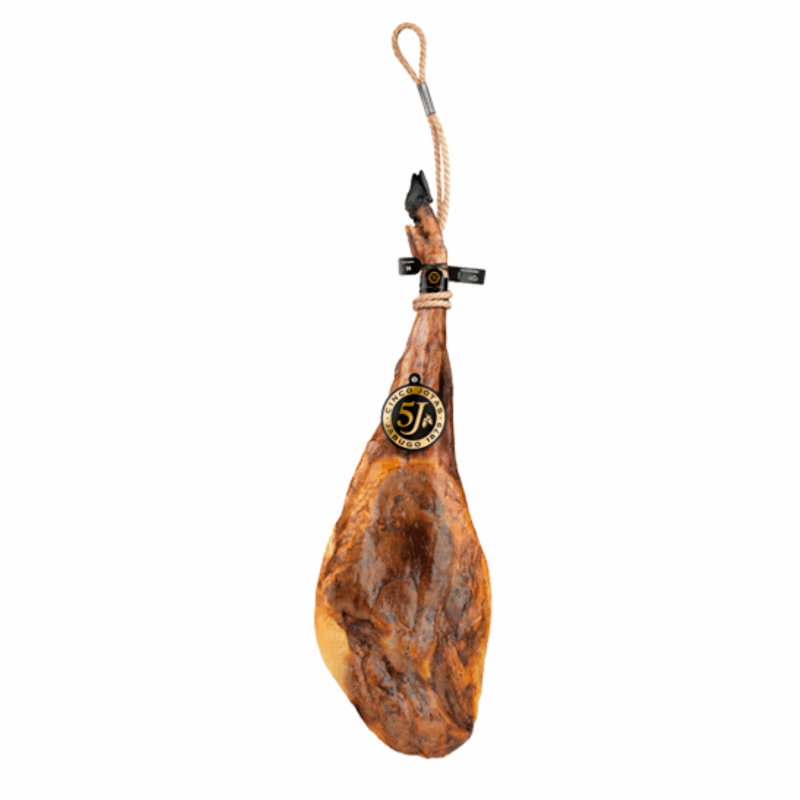
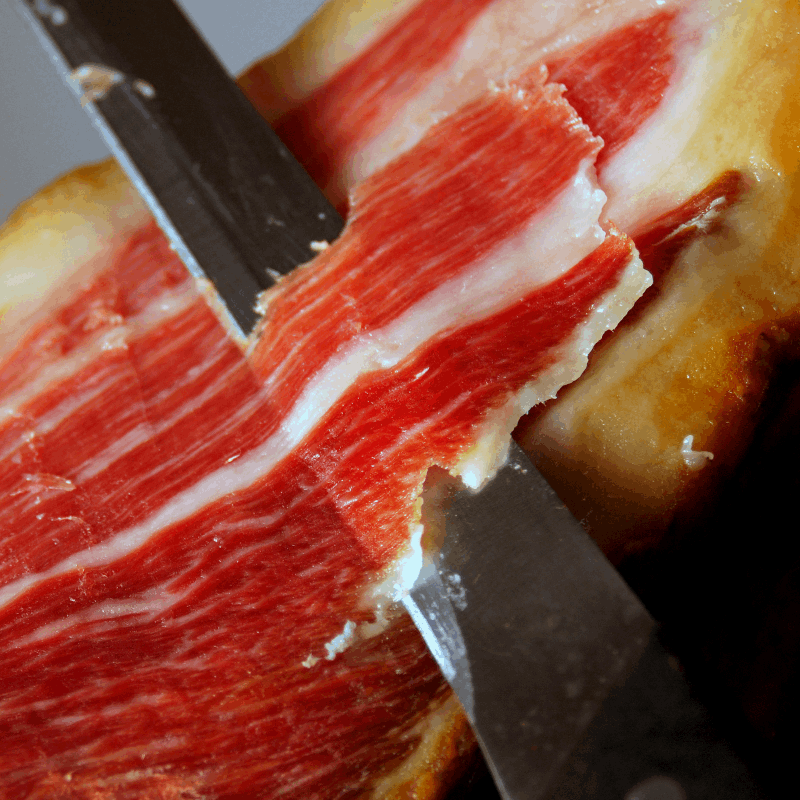
Pata de Jamón 100% Ibérico de Bellota "Pata Negra" - Cinco Jotas
$1,399.00
Precio unitario porPata de Jamón 100% Ibérico de Bellota "Pata Negra" - Cinco Jotas
$1,399.00
Precio unitario porDescubre el Exquisito Sabor del Jamón Ibérico de Bellota de Cinco Jotas con Hueso
Disfruta del lujoso Jamón Ibérico de Bellota de Cinco Jotas, elaborado a partir de cerdos 100% ibéricos de pura raza criados en libertad en la dehesa y alimentados con bellotas durante la montanera. Proveniente de Jabugo, este jamón presenta una textura marmoleada única y un sabor complejo con notas a frutos secos, lo que lo convierte en un verdadero Pata Negra.
¿Por Qué Elegir Jamón Ibérico de Bellota de Cinco Jotas?
- Origen en Jabugo: Renombrado por sus productos de máxima calidad.
- Cerdos 100% ibéricos: Criados en libertad en la dehesa con prácticas tradicionales.
- Alimentación con bellotas: Durante la montanera, las bellotas añaden un sabor distintivo.
- Marca 5J: Cinco Jotas es sinónimo de excelencia en jamones ibéricos.
Cómo Cortar Tu Jamón Ibérico de Bellota con Hueso
Cortar una pata entera de jamón ibérico es fácil con las herramientas adecuadas:
- Un jamonero estable para fijar la pata.
- Un cuchillo jamonero largo y flexible para cortes finos y precisos.
- Una chaira para mantener el cuchillo afilado.
Perfecto para Tapas, Tablas de Embutidos y Platos Gourmet
El Jamón Ibérico de Bellota Cinco Jotas es ideal para preparar auténticas tapas españolas, servir en tablas de embutidos o realzar tus platos gourmet favoritos. Combínalo con queso Manchego, aceitunas y una copa de vino tinto para saborear el auténtico sabor de la dehesa española.
Compra Jamón Ibérico de Bellota Cinco Jotas con Hueso Online en EE.UU.
¿Listo para experimentar el verdadero Pata Negra? Ordena tu Jamón Ibérico de Bellota de Cinco Jotas en Ibérico Taste y disfruta de una entrega rápida y segura en EE.UU. Perfecto para ocasiones especiales, reuniones familiares o como regalo gourmet, este jamón ibérico trae los sabores auténticos de la dehesa española directamente a tu mesa.
Paleta Ibérica de Bellota 100% Raza Ibérica con Hueso – BEHER Gold Label
Descubre el auténtico sabor de España con la Paleta Ibérica de Bellota BEHER Gold Label, elaborada con cerdos 100% raza ibérica criados en libertad en las dehesas y alimentados con bellotas durante la montanera.
¿Por Qué Elegir la Paleta Ibérica de Bellota BEHER?
- Calidad Pata Negra: Cerdos certificados 100% raza ibérica.
- Cría en Libertad: Criados en dehesas de Jabugo y otras regiones selectas.
- Dieta de Bellota: Alimentados con bellotas, pastos y hierbas que aportan un sabor y veteado únicos.
- Curación Artesanal: Proceso tradicional de curación lenta que potencia su sabor y textura.
- Aporte Saludable: Rica en ácido oleico, proteínas, vitaminas B1 y E, hierro y zinc.
Perfil Organoléptico
- Apariencia: Carne rojo cereza con grasa veteada dorada y fluida.
- Aroma: Complejo e intenso, con notas a frutos secos y hierbas del monte.
- Sabor: Dulce, equilibrado y jugoso, con un retrogusto prolongado y delicioso.
Recomendaciones de Consumo
- Acompaña con queso Manchego curado o Garrotxa.
- Marida con vinos Ribera del Duero, Rioja o fino seco.
- Sírvelo con pan rústico y un chorrito de aceite de oliva virgen extra.
- Completa la experiencia con higos frescos, melón o pera.
Presentación y Conservación
Esta paleta se presenta en una funda de algodón y caja de diseño elegante, ideal para regalar o disfrutar en tu cocina. Conservar en lugar fresco y seco.
Compra Online la Paleta Pata Negra BEHER en EE.UU.
Compra la Paleta Ibérica de Bellota 100% Raza Ibérica BEHER en Ibérico Taste. Envío rápido y seguro desde Miami a todo EE.UU. Disfr
Jamón de Bellota 100% Ibérico con Hueso BEHER – Etiqueta Oro Pata Negra
El Jamón Ibérico Más Premiado del Mundo
Descubre la excelencia de la gastronomía española con el Jamón de Bellota 100% Ibérico con hueso de BEHER, Etiqueta Oro. Reconocido como el jamón Pata Negra más premiado del mundo, este producto procede de cerdos 100% ibéricos criados en libertad en las dehesas de Jabugo y Guijuelo, alimentados con bellotas durante la montanera.
¿Por Qué Elegir el Jamón 100% Ibérico de Bellota BEHER?
- Calidad Pata Negra: Elaborado con cerdos 100% ibéricos puros, criados en libertad.
- Alimentación con Bellota: Dieta natural a base de bellotas, hierbas y pastos.
- Curación Tradicional: Más de 36 meses de curación natural con métodos artesanales.
- Infiltración de Grasa: Textura jugosa y sabor a frutos secos gracias al veteado único.
- Selección Limitada: Etiqueta Oro numerada, seleccionada entre las mejores piezas.
Sabor y Maridajes
Este jamón con hueso ofrece un sabor profundo, equilibrado y persistente, con notas a hierbas y frutos secos, y una textura untuosa que se deshace en la boca. Disfrútalo siempre a temperatura ambiente.
- Vino: Marida con Rioja, Ribera del Duero o Jerez seco.
- Quesos: Manchego curado, Payoyo o Mahón añejo.
- Acompañamientos: Pan rústico, aceitunas Arbequina o almendras Marcona.
Presentación Elegante
Este jamón gourmet se presenta en una funda de algodón y caja de diseño, ideal para regalar o lucir en una tabla de charcutería de alta gama. Conservar en lugar fresco y seco o refrigerado (2–7 °C).
Compra Jamón de Bellota 100% Ibérico BEHER – Envío Rápido en EE. UU.
Haz tu pedido en Ibérico Taste y recibe en casa el auténtico jamón Pata Negra directamente desde España. Envíos rápidos y seguros en todo Estados Unidos.
Comprar Patas de Jamón Ibérico y Serrano
Si alguna vez has soñado con tener una pata entera de jamón en casa, esta es tu oportunidad. Perfecta para celebraciones, fiestas o simplemente para cortar una loncha cuando te apetezca, una pieza entera de jamón ibérico o serrano es una experiencia única.
En nuestra tienda encontrarás piezas de jamón con hueso de las mejores marcas de España como 5J Cinco Jotas, Fermín, Beher y más. Puedes elegir entre jamón ibérico de bellota 100%, jamón serrano Gran Reserva y otras opciones de calidad gourmet.
Compra jamón español entero online con envío a todo EE. UU. Garantizamos frescura y seguridad gracias a nuestro embalaje protector y entrega rápida.
Patas de Jamón Ibérico y Serrano FAQs
La vida útil de una pata de jamón entera con hueso puede variar significativamente según varios factores, como el tipo de jamón, las condiciones de almacenamiento y si ha sido empezado o no. En general, un jamón ibérico o serrano entero con hueso, almacenado correctamente, puede conservarse hasta un año o incluso más si se mantiene en un lugar fresco y seco. Sin embargo, una vez cortado, lo ideal es consumirlo en pocas semanas para disfrutar de su sabor y calidad óptimos.
Aquí tienes algunos consejos de conservación:
El ibérico tiene más grasa infiltrada y sabor intenso. El serrano es más magro y suave.
El jamón proviene de las patas traseras del cerdo, mientras que la paletilla, como se conoce en español, se obtiene de las patas delanteras. El término "paletilla" es anatómicamente adecuado, ya que designa la parte frontal del animal.
Los jamones suelen ser más largos, alcanzando hasta los 90 centímetros, mientras que las paletillas son más cortas, generalmente entre 60 y 75 centímetros. En cuanto al ancho, los jamones son más anchos y redondeados en comparación con las paletillas, que tienen una forma más estilizada.
Naturalmente, estas diferencias de tamaño influyen en el peso: las paletillas pesan en promedio alrededor de 5 kilos, mientras que los jamones suelen pesar entre 7 y 8 kilos, y a menudo superan esa cifra.
En cuanto al sabor, el jamón ofrece un perfil más diverso y complejo, lo que lo convierte en la opción ideal para los amantes experimentados de los productos ibéricos. Por su parte, la paletilla presenta un sabor más intenso y directo, debido a su diferente tiempo de curación.
Seleccionar el jamón adecuado depende de las preferencias personales y del uso que se le vaya a dar. Ten en cuenta lo siguiente:
Preferencias de sabor: Si buscas un sabor intenso y profundo, el jamón ibérico —especialmente el de bellota— es una excelente opción. Si prefieres un sabor más suave, el jamón serrano puede ser la mejor elección.
Presupuesto: Los jamones ibéricos suelen ser más caros debido a la raza del cerdo y a su alimentación específica. Los jamones serranos, en cambio, son más económicos, lo que los hace ideales para un consumo más habitual.
Ocasión: Para celebraciones especiales o experiencias gourmet, el jamón ibérico suele ser el favorito. El jamón serrano, por su parte, es perfecto para reuniones informales o para disfrutar en el día a día.
Las técnicas adecuadas de conservación y almacenamiento son esenciales para mantener la calidad y el sabor del jamón ibérico y serrano. Saber cómo envolver, guardar y preservar estos jamones permite conservar sus características únicas durante el mayor tiempo posible.
Envoltura y almacenamiento
Una envoltura y almacenamiento eficaces son fundamentales para prolongar la vida útil de una pata de jamón entera con hueso. La forma en que se envuelve el jamón puede afectar considerablemente su sabor y textura con el tiempo.
Envolver el jamón en tela de quesero (cheesecloth) o papel de estraza permite que respire, al tiempo que lo protege del polvo. Evita el plástico, ya que atrapa la humedad y puede provocar deterioro.
Si es posible, cuelga la pata en un lugar fresco y seco. Esto favorece una circulación óptima del aire y reduce el riesgo de acumulación de humedad.
La temperatura ideal de conservación está entre 10°C y 21°C (50°F y 70°F), con un nivel de humedad en torno al 70%, lo que permite preservar el jamón sin comprometer su sabor.
Cómo mantener el sabor
Para conservar los sabores y texturas del jamón, es importante seguir ciertas prácticas:
Corta únicamente la cantidad que vayas a consumir en el momento. Exponer toda la superficie acelera el secado y puede reducir el sabor.Tras cortar, cubre la parte expuesta con la misma tela de quesero o papel de estraza para minimizar la exposición al aire y evitar que se reseque.
Guarda el jamón alejado de alimentos con olores intensos, ya que estos pueden transferirse fácilmente y alterar el aroma natural del jamón.
Consejos para conservación a largo plazo
Si planeas guardar el jamón durante un período prolongado, sigue estas recomendaciones para mantener su calidad:
Aunque no es lo ideal, si es estrictamente necesario puedes sellar al vacío el jamón y congelarlo para alargar su vida útil. Cuando vayas a consumirlo, descongélalo lentamente en el refrigerador.
Verifica periódicamente la temperatura y la humedad del lugar donde se guarda el jamón. Usa un termómetro e higrómetro para asegurar condiciones estables.
Revisa regularmente que el jamón no presente signos de deterioro, como malos olores o texturas inusuales. Cualquier cambio puede indicar que debes ajustar la forma en que se está almacenando.
¿Quieres que te lo entregue también en formato HTML listo para Shopify o para un blog?
Entre el 40% y 50% del peso total, dependiendo del corte.
No es necesario. El jamón se envía en embalaje protector y es estable a temperatura ambiente.

